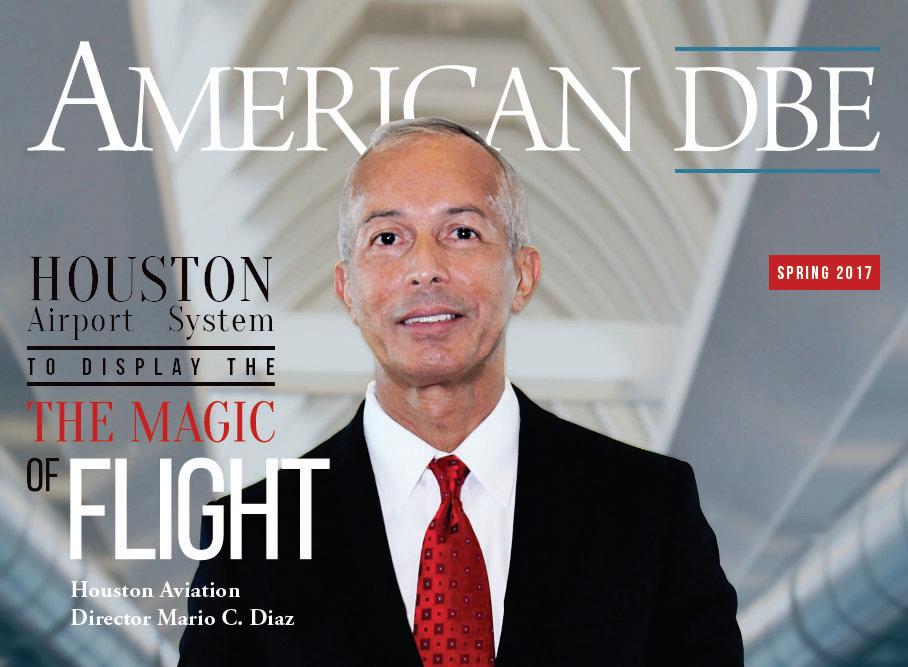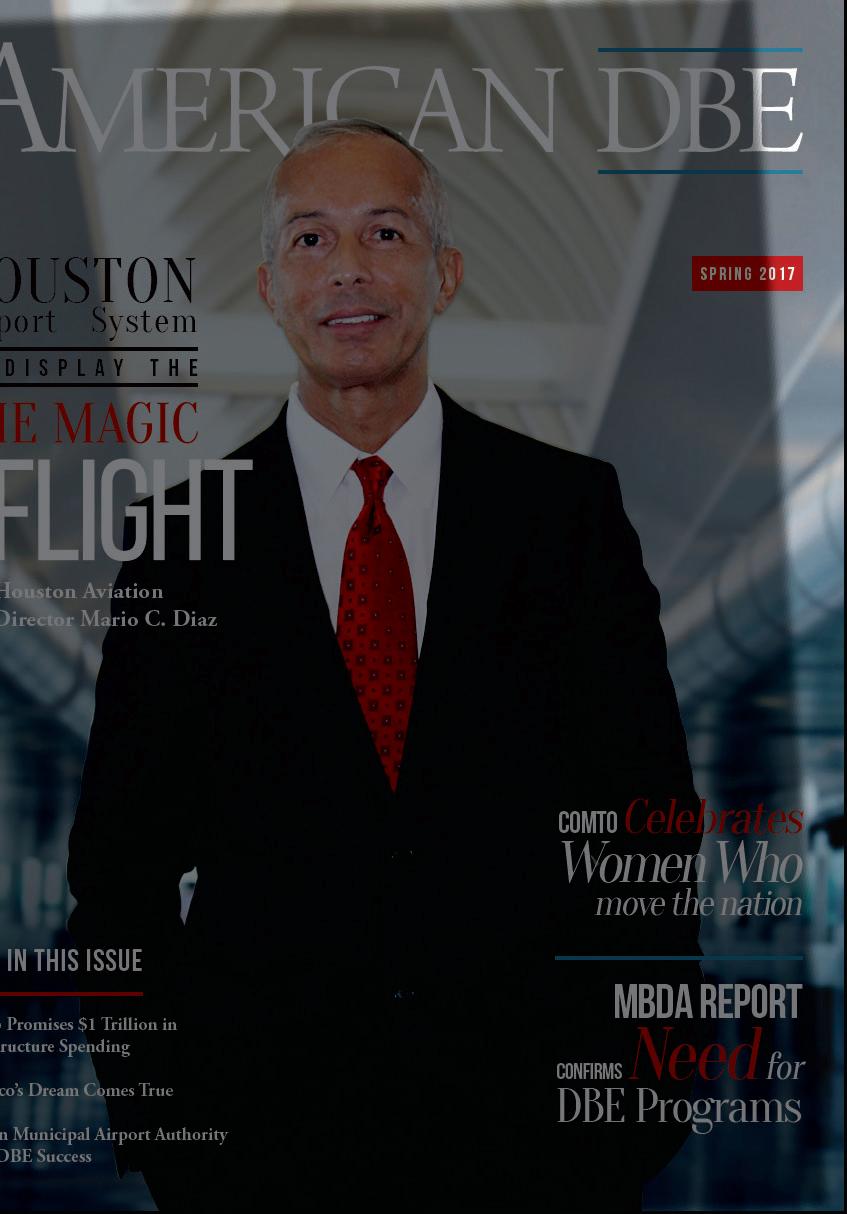




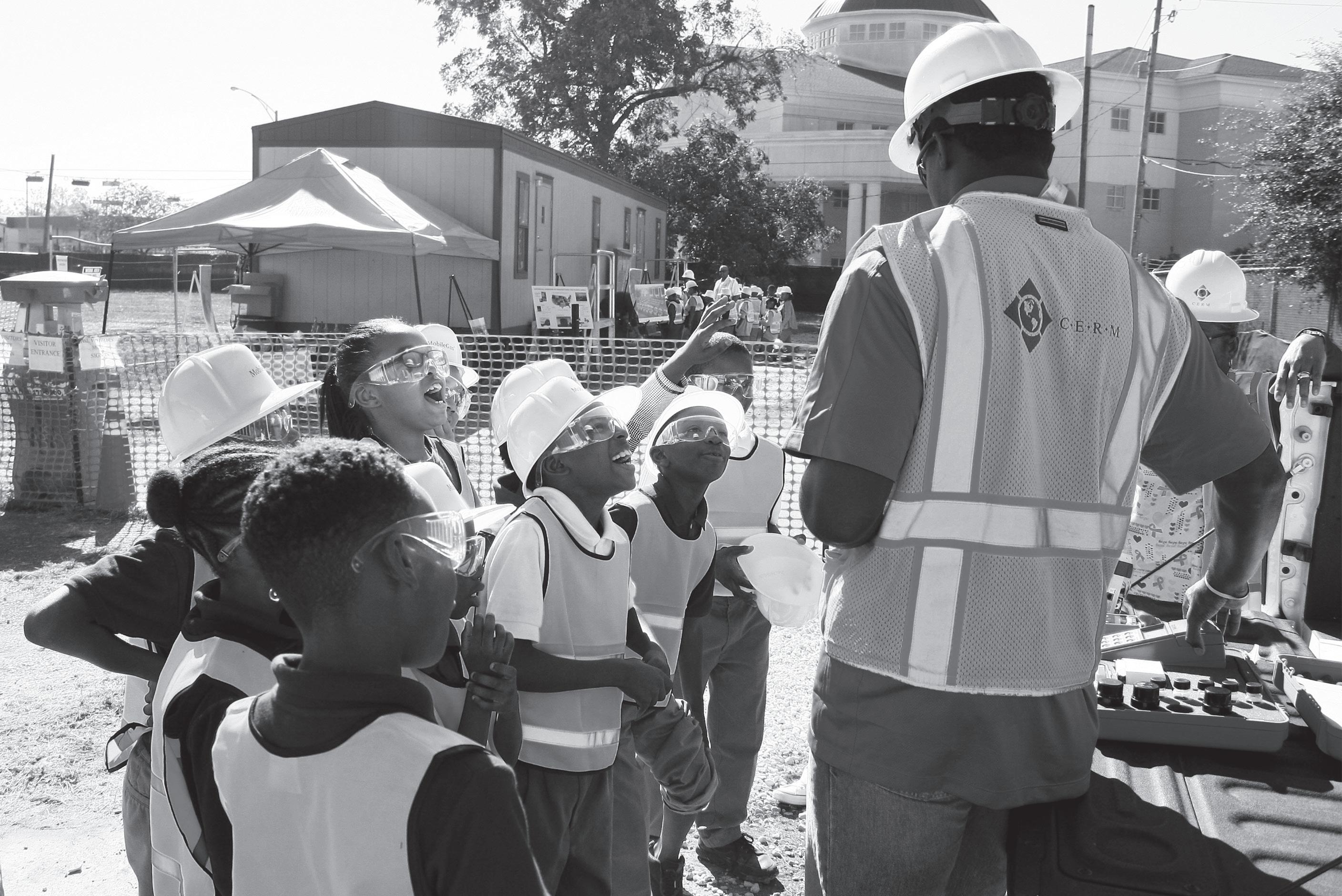


The Metropolitan Washington Airports Authority (MWAA) offers small businesses a place to grow.

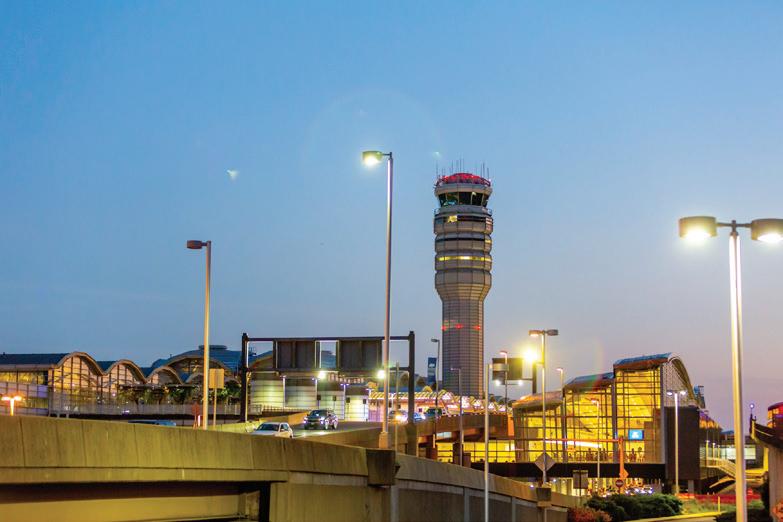


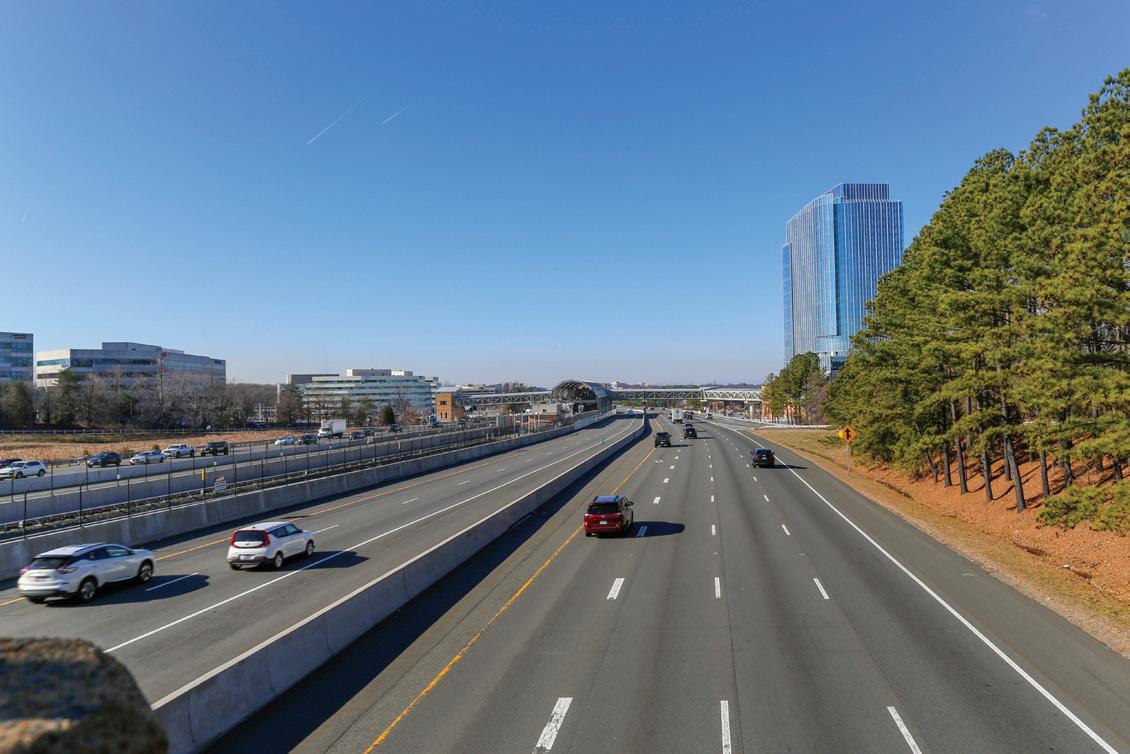
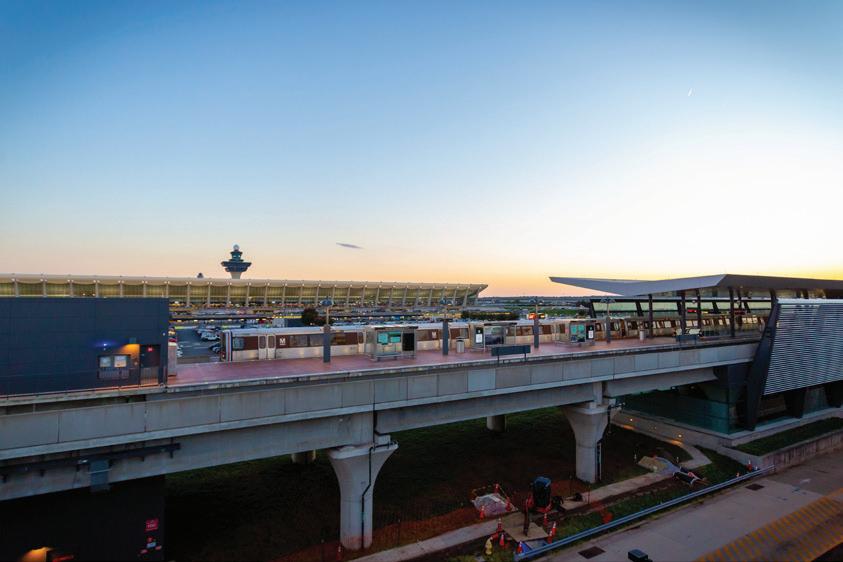

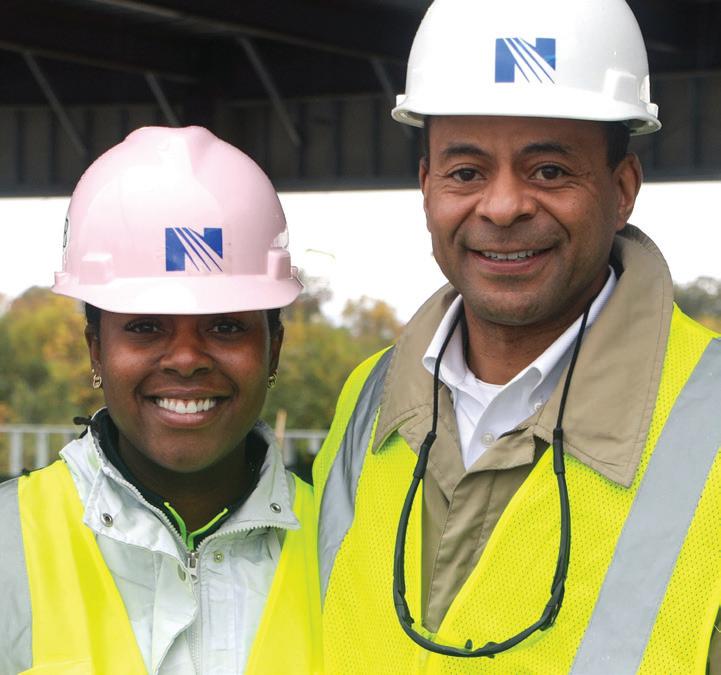
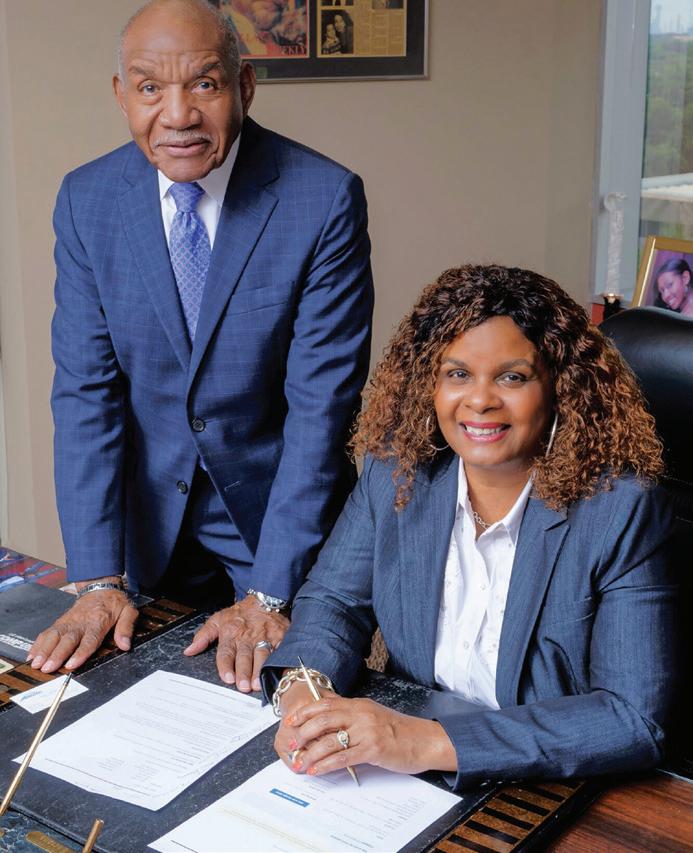


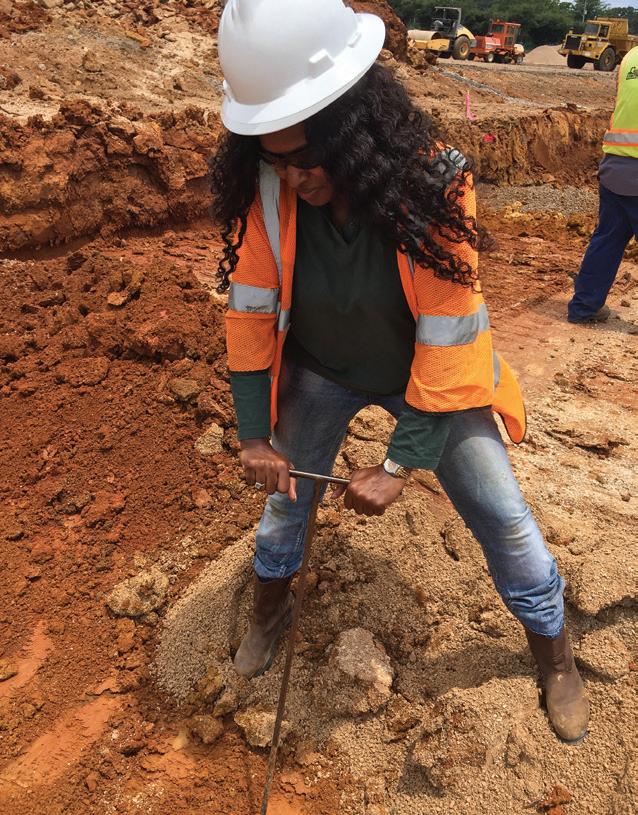
Publisher Shelton A. Russell
Managing Editors PR PROS, LLC
Creative Director
William Cash
Digital Media Premier Web Design Solutions
Headquarters 514 Daniels Street, #186 Raleigh, NC 27605
Website www.AmericanDBE.com
About American DBE Magazine
American DBE Magazine is the premier industry resource for individuals and stakeholders who work in the infrastructure, construction and transportation industries. American DBE Magazine is published quarterly and distributed in all 50 states— plus Puerto Rico and the U.S. Virgin Islands—to DBE program administrators, business owners, and professionals in the Aviation, Highway Construction and Public Transit industries.

American DBE Magazine is published quarterly in Fall, Winter, Spring and Summer editions. The annual subscription rate is $24.99 including online editions, special industry reports, and four issues: single copy list price is $6.99 plus postage originating from Raleigh, North Carolina.
Advertising Sales editor@AmericanDBE.com (919) 741-5233 (Office)

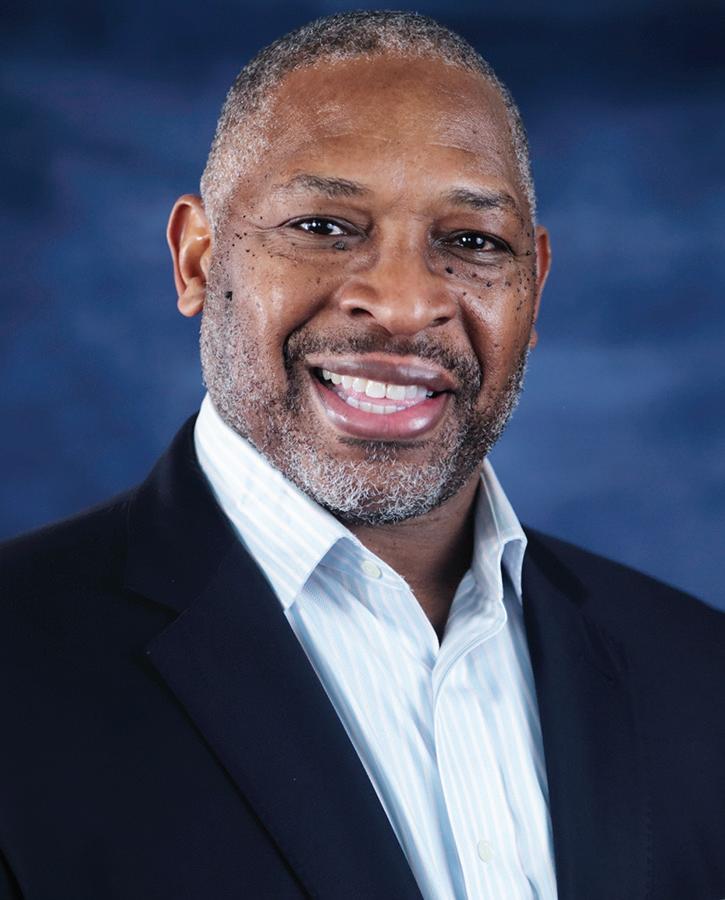
The more laps I make around the sun, the more I understand the adage, “The more things change, the more they remain the same.” Progress for African Americans and other minorities, as well as for women, has always occurred in fits and starts, with periods of advancement followed by periods of regression. I believe we have entered another of those periods where the gains of a robust economy, marked by record-setting business opportunities in infrastructure and construction, are now challenged by court rulings, politicians, and corporate policies retracting the paper-thin commitment to diversity, equity, and inclusion proclaimed just five short years ago after the murder of George Floyd.
This, however, is nothing new. It has been a constant in American history, beginning with the broken promise of 40 acres and a mule after emancipation. It continued with the sinister mismanagement and loss of thousands of African Americans’ life savings by the Freedman’s Savings Bank. The progress of Native Americans in negotiating peace with the American government was soon eliminated in the name of eminent domain.
The hope and promise of Reconstruction gave way to a host of Jim Crow laws designed to slow the progress of African Americans in American society. Progress in segregated communities in cities like Tulsa, Oklahoma, and Wilmington, North Carolina, along with many others across the country, was destroyed by jealousy and bigotry supported by government institutions. Most recently, the gains and progress of the Civil Rights Movement, the passage of the Civil Rights Act of 1964, and other anti-discrimination laws have continued to be eroded by redefining equity and equality to maintain the status quo.
As the poet Maya Angelou said, “And still we rise.” This issue of American DBE Magazine is dedicated to diverse companies and organizations that continue to push toward equity and inclusion. These groups understand that the ultimate goal is creating an American society where all citizens participate at the same level and enjoy the same benefits. Moreover, they recognize that sweeping historical barriers and discrimination under the rug of history is unproductive and unfair.
Our cover story spotlights Norton Healthcare’s opening of the first hospital in West Louisville in more than a century, providing equitable healthcare access and business opportunities. Another feature story shares Dallas-based Dikita Enterprise’s success in building a thriving firm based on integrity, family values and hard work. The final feature story shares an update on recent legal challenges to the DBE Program
and how state transportation agencies are reorganizing their programs in response to an adverse ruling by a federal district court in Kentucky.
This issue’s DBE Power Player is Birmingham-based Slade LLC, a womanowned firm striving to overcome growing pains while providing career opportunities in underserved communities. The Program Spotlight article highlights the work of the Tennessee Department of Transportation in preparing DBE firms for opportunities in the state’s infrastructure improvement program, while also adjusting the program to comply with the new DBE Final Rule enacted in 2024. Other stories in this issue include the Triangle Transit RUS Bus project and more.
We hope you find inspiration and valuable insights in this issue as we continue to spotlight those who persevere and innovate despite the challenges they face.

Shelton A. Russell, Publisher American DBE Magazine

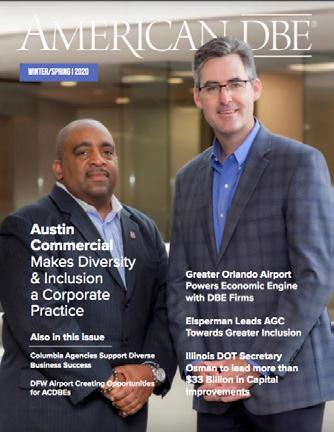
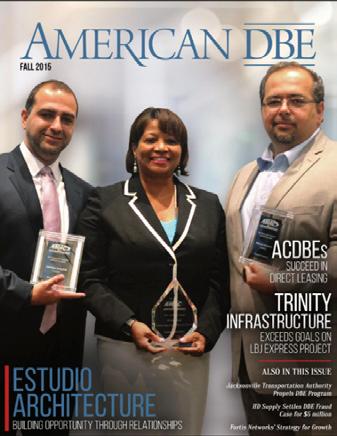
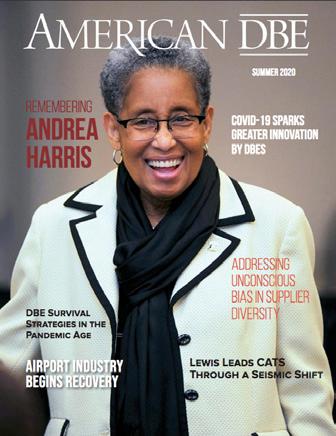




by Shelton A. Russell

A recent ruling by the U.S. District Court for the Eastern District of Kentucky has placed the Disadvantaged Business Enterprise (DBE) Program under significant scrutiny, impacting federally funded contracts in 25 states. The court’s decision follows a lawsuit filed by two non-DBE subcontractors, MidAmerica Milling Company and Bagshaw Trucking, who allege that the DBE Program unlawfully discriminates based on race and gender, violating the Equal Protection Clause of the Fourteenth Amendment. They claim the program’s race-conscious goals create an unfair playing field and limit their opportunities to compete on an equal basis.
The U.S. Department of Transportation (USDOT) and the U.S. Department of Justice (DOJ) responded to the ruling by issuing a guidance memo to Federal Highway Administration (FHWA) Division Offices in the affected states. The memo instructs state transportation departments to comply with the court’s directive, which prohibits the inclusion of DBE contract goals on projects

the plaintiffs plan to bid on in the future. Initially, USDOT interpreted the ruling as applicable to contracts in Indiana and Kentucky, but a subsequent clarification from the court expanded its scope nationwide wherever the plaintiffs operate.
On September 23, 2024, the court issued a preliminary injunction preventing USDOT from enforcing DBE goals on federally funded contracts involving the plaintiffs. The court argued that the DBE Program’s reliance on race and gender classifications was unconstitutional, failing to meet the standards of equal protection under the law. The decision emphasized that the DBE Program was not narrowly tailored to specific groups that could demonstrate clear instances of discrimination requiring race-conscious measures.
In a further blow to the program, the court pointed out that the DBE Program
lacks a defined end date, undermining its legality. According to the ruling, race-based preferences must be temporary and tied to specific, measurable goals. The court stated that without a foreseeable conclusion, the program fails to comply with constitutional requirements. The court used the analogy, “It cannot group all minority-owned businesses into one gumbo pot but then try to scoop out only the sausage and not the okra,” to illustrate the perceived flaws in the program’s approach.
The expansion of the injunction to any state where the plaintiffs plan to bid has raised concerns among state and local transportation agencies, as well as DBE firms. With the program now in question across multiple jurisdictions, USDOT must decide whether to appeal the decision, modify the DBE Program to align with constitutional standards, or negotiate a settlement with the plaintiffs to address their concerns and ensure continued support for disadvantaged businesses.
The plaintiffs have identified 25 states where they currently operate or plan to bid on federally funded state contracts with DBE goals, including Alabama, Arkansas, Delaware, Florida, Georgia, Illinois, Indiana, Iowa, Kansas, Kentucky, Louisiana, Michigan, Minnesota, Mississippi, Missouri, New Jersey, North Carolina, Ohio, Oklahoma, Pennsylvania, South Carolina, Tennessee, Texas, Virginia, and West Virginia. As they continue to expand their operations, other states may also come under the purview of the ruling, further complicating the program’s implementation.
The ruling could have far-reaching consequences beyond the immediate plaintiffs, potentially setting a precedent for
other legal challenges to the DBE Program. If additional contractors follow suit, it could lead to a widespread reevaluation of how state and local agencies implement DBE goals in federally funded contracts. This uncertainty poses challenges for Disadvantaged Business Enterprises, who rely on the program to gain fair access to contracting opportunities.
USDOT has several paths forward. It may choose to appeal the ruling in a higher court, seeking to overturn or limit the scope of the injunction. Alternatively, USDOT may revise the DBE Program to better align with constitutional standards, ensuring that goals are narrowly tailored and time-bound. Another option is to enter negotiations with the plaintiffs to seek a compromise that preserves the program’s core objectives while addressing the legal concerns raised by the court.
As the situation evolves, stakeholders— including transportation agencies, contractors, and DBE firms—must remain vigilant and adaptable. The uncertainty surrounding the DBE Program requires careful planning to ensure compliance with legal mandates while continuing to promote diversity and inclusion in transportation contracting.
The court’s decision marks a critical juncture for the DBE Program. Whether through legal challenges or programmatic adjustments, its future hangs in the balance as stakeholders navigate this complex and evolving landscape.
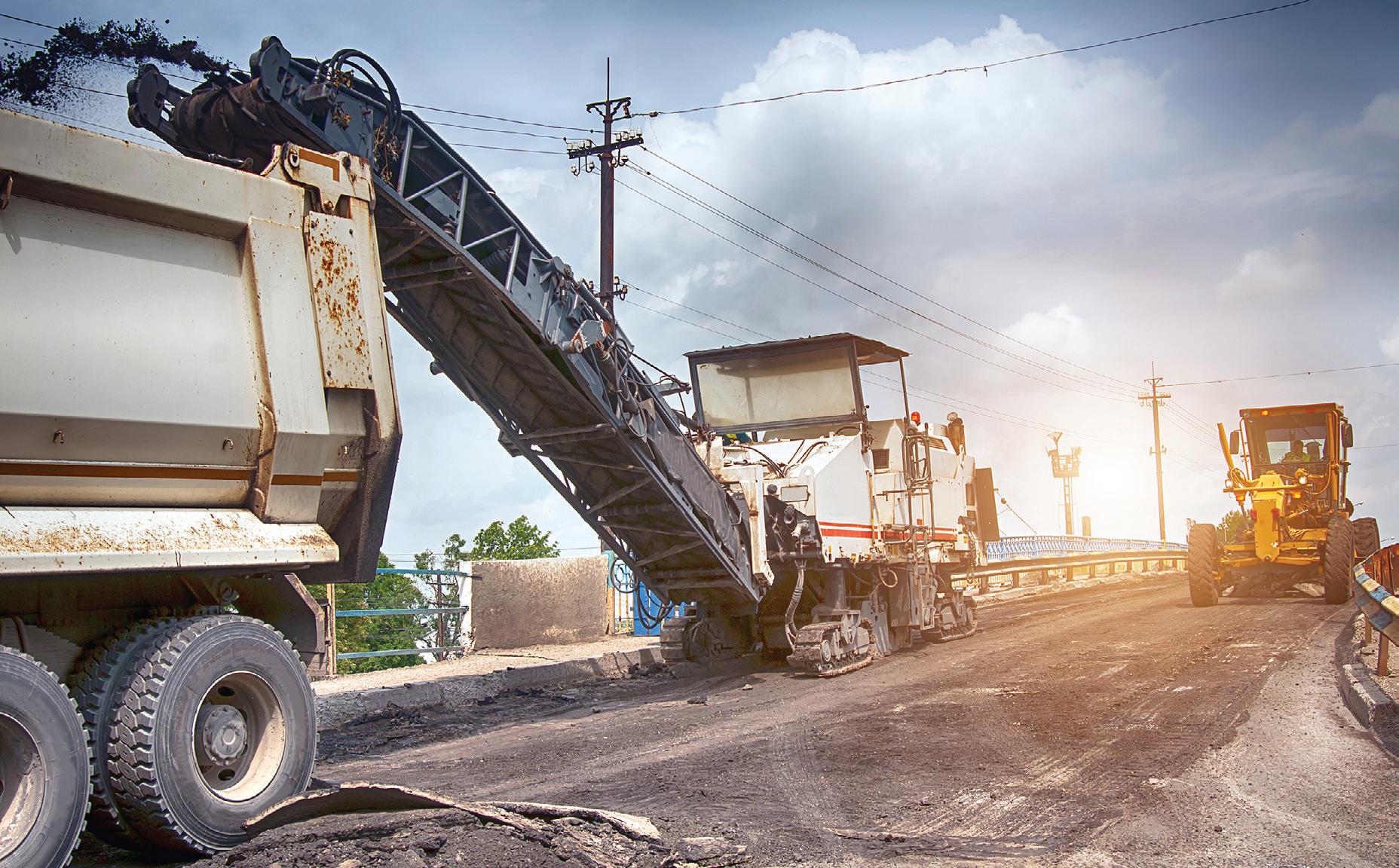


It is not uncommon for entrepreneurs’ offspring to crave the opportunity to chart a separate path from the one created by their parents. The reasons may vary from a general disinterest in the industry their parents selected to a desire for complete autonomy away from their parents’ guidance and direction. Evalynn “Eve” Williams faced a similar decision when finishing college with a business management degree. Her father, Lucious Williams (a Korean War veteran and Negro Baseball League legend), wanted her to join the engineering firm he had started a few years earlier. He knew she had the skills he needed, but Eve had dreams of a highpowered career in the IT industry.
However, Lucious could offer something other potential employers couldn’t: parental guilt. “Yeah, he had me because he paid for my college degree and promised it would only be for two years, and almost 40 years later, here I am. He tricked me,” Eve said with a smile. Eve says that after reading the company’s business plan, she knew she had the skills to tighten it up and bring administrative expertise to the operation. She joined the company in 1983 and became the Chief Financial Officer in 1985. She was named President and CEO in 2010, while Lucious continued to serve as the chairman of the board and Director of Business Development/ Government Affairs.
Lucious started Dikita Enterprises Inc. (Dikita) in 1979 in his hometown of Milwaukee, Wisconsin, but moved to Dallas, Texas, in 1983 for better

opportunities. Dikita initially focused on the civil engineering industry and on winning contracts with government agencies like the Dallas Area Rapid Transit (DART), Dallas/ Fort Worth International Airport (DFW), Texas Department of Transportation (TxDOT), City of Dallas, and other local government agencies. The company undertook various projects during the early years to find a footing in the industry and stay afloat. “We did whatever we needed to do to survive. I remember we had a contract to remove sludge from toxic waste sites in Louisiana,” Eve said.
Since its humble beginnings with just three employees—Lucious, Eve, and an engineer from Milwaukee—Dikita has expanded and evolved into new industries as opportunities presented themselves. The firm now has over 60 employees and is a leading program management, architecture, and engineering firm in the North Texas region. Its primary markets include serving public clients in the municipal facilities, highway transportation, transit, aviation, higher education, and K-12 educational markets.
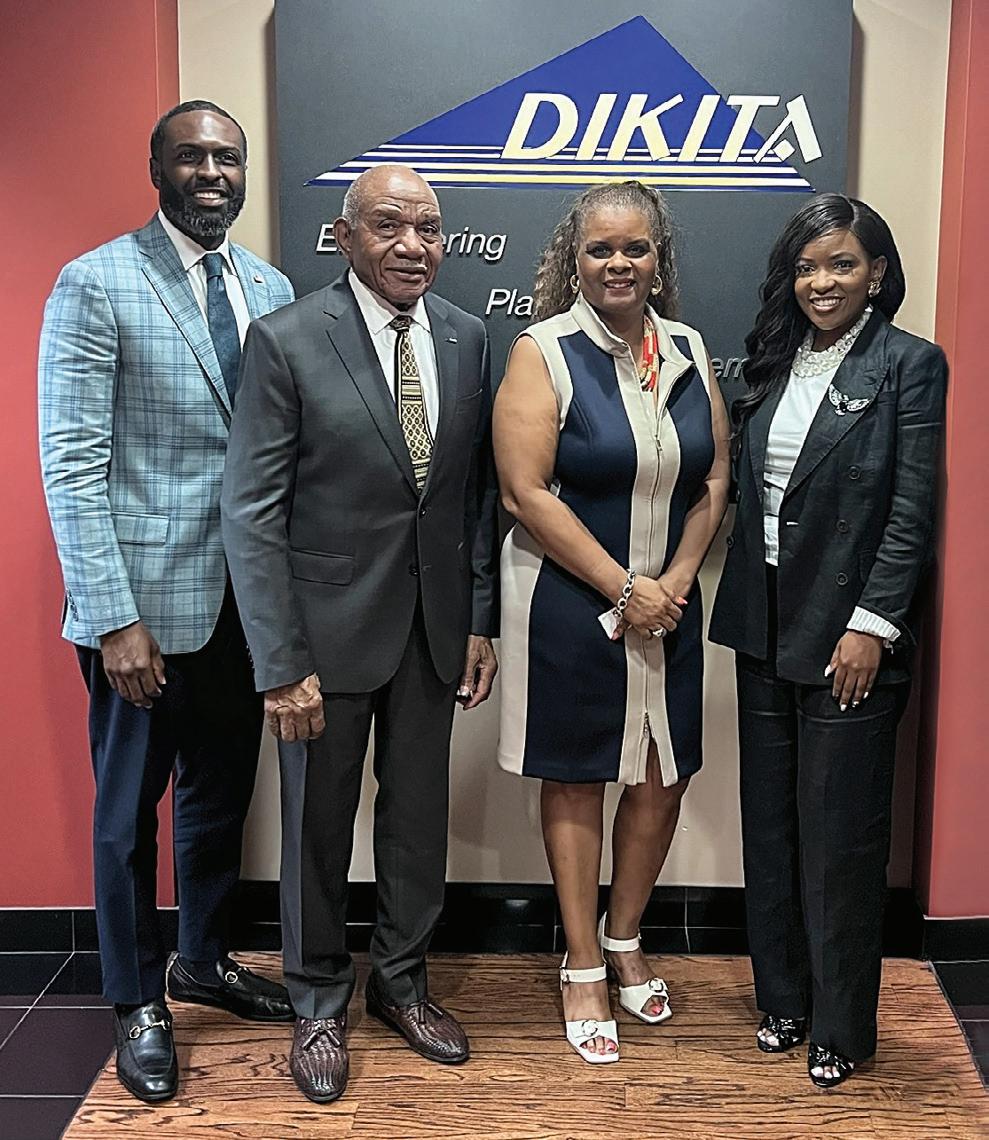
The company maintains long-standing relationships with DART, DFW Airport, and TxDOT, extending for more than 30 years; and these clients remain at the core of the firm’s revenue base. The firm has also become an established program manager for school construction projects. After participating in the Dallas Independent School District’s (DISD) Bond Construction Program as a sub-consultant on the program management team for 15 years, Dikita won its first prime contract for construction management in 2015 and again in 2020. The firm is one of the top three program management firms working on the program. Dikita is responsible for more than 40 school buildings scheduled for new construction or extensive renovation. “The best reward in working with DISD’s district is the opportunity to serve marginalized communities. These children look like mine,” Eve said.
From the beginning, creating a legacy and succession planning were part of Lucious’s plan for Dikita. Although Eve was always a vital member of the leadership team from the early years of the business, Lucious especially focused on preparing her to lead the company into the future. Her development included participating in nonprofits, community, and national boards to give her exposure. “My dad knows me very well, and he knew that he had to let me figure out what I was passionate about to keep me interested and engaged, and he did that,” Eve said. Her interest led the company to pursue opportunities in transit market research, which developed into an essential line of business over the years. Dikita won its first contract with DART to conduct ridership studies for bus routes in 1985, and the company has held the contract as a prime data source for DART since 1991.
Eve uses the same strategy as the third generation of leadership for the company develops, as her daughter Whitney recently joined the company. Eve understands the importance of encouraging the next generation of leadership to develop new avenues for the company based on their unique interests and passion while keeping the core of what makes the company successful. Whitney is thriving in the company and is starting to explore opportunities in real estate development and retail. “I let her know that most people would die to have access to the resources she has at Dikita. She doesn’t have to go out and recreate the wheel; we can add what she is passionate about to what we are doing here and have a wagon and a wheel,” Eve said with laughter.
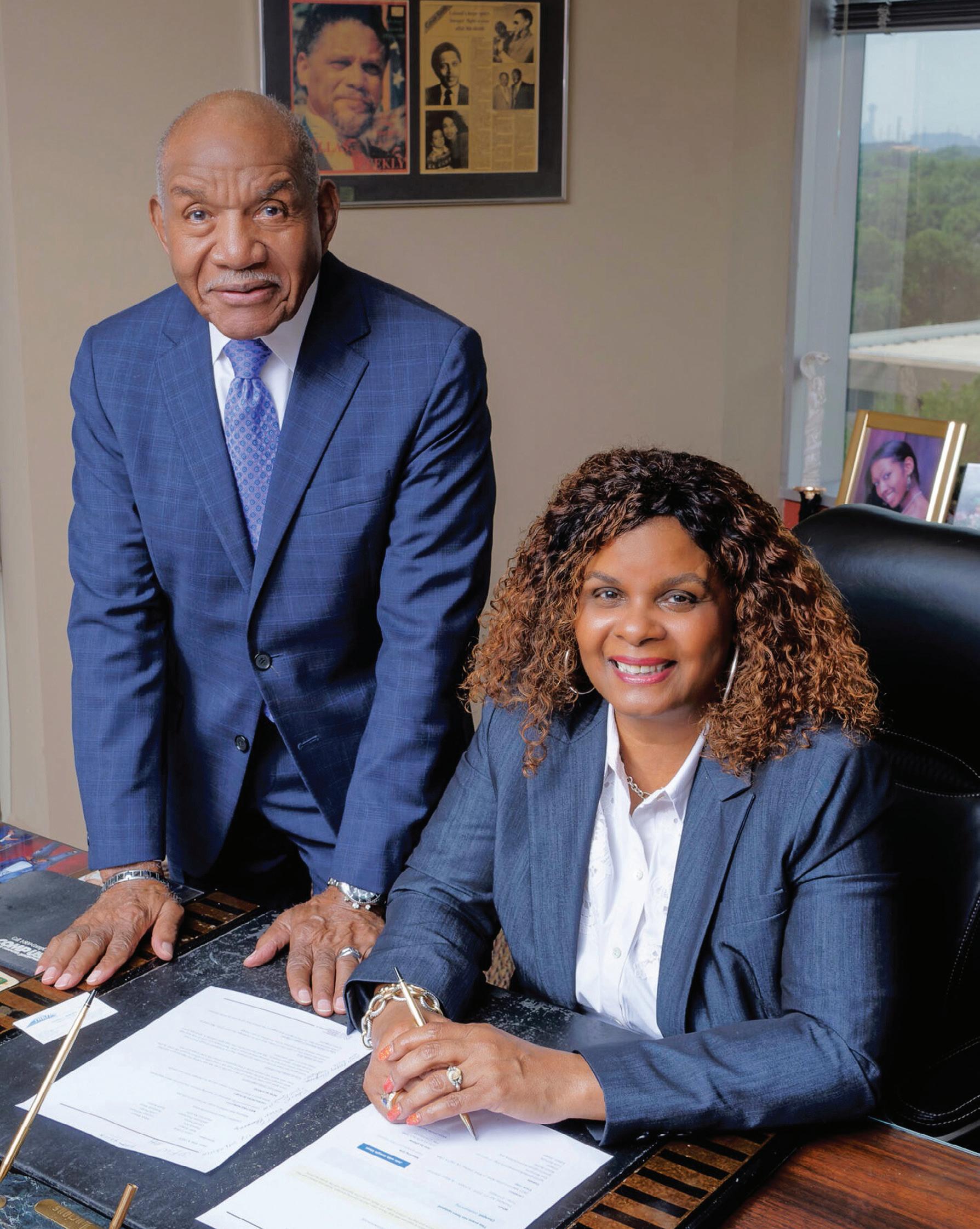
Eve Williams, President and CEO of Dikita Enterprises, alongside her father and company founder, Lucious Williams, reflecting on the company’s journey and commitment to legacy building.
Sharing the vision and leadership of the firm has been a hallmark of Lucious’s and Eve’s leadership. Eve believes it is one of several leadership traits she picked up from her father. Two other critical traits she learned from her father are patience and integrity.
She defines patience as carefully considering business decisions before acting and giving new strategies time to develop and become successful. She says integrity and ethics involve avoiding questionable business relationships and being committed to the highest ethical standards. Eve chuckles as she remembers her dad talking to her about patience. “My dad told me the story about the old bull and the young bull on top of the hill looking at all the cows downhill. The young bull says, ‘Let’s run down and get us a cow,’ and the old bull said, ‘No, let’s walk down there and get them all.’”
Eve’s desire is to impart the same commonsense wisdom to the next generation of leadership, which will include her oldest daughter, Erika, so that the company can continue building a generation of “old money.” This legacy will include many significant projects across the U.S. and several industry sectors. “We want to continue to grow our name and our presence here in Dallas, and hopefully one day there will be a road or school or hospital with our name on it because of what we’ve done,” Eve said.

Although growing a successful business requires constant attention and effort, Eve believes giving back to the industry and her community is essential. She carves time from her schedule to stay active in the American Public Transit Association (APTA), where she has served in several leadership roles throughout her career. She is a member of APTA’s Business Member Board of Governors (where she was the first African American woman to chair the board), APTA’s Executive Committee, and the past chair of the Business Member Small Business Committee. These roles led to increased exposure and recognition as an industry leader who strongly advocates for businesses owned by minorities and women.
In 2020, Congressman Peter DeFazio (D-OR) invited Eve to testify before Congress concerning the DOT Federal Disadvantaged Business Enterprise Program, where she spoke of the challenges facing the program, including personal net worth and reciprocal state-to-state certification processes for DBEs. She gave recommendations to improve the program for entrepreneurs across the country. Some of these recommendations were cited and became part of the new DBE Final Rule announced in April 2024 by U.S. Transportation Secretary Pete Buttigieg. Eve was one of three DBE business owners asked to serve on a panel discussion during the rollout of the new DBE Final Rule at the USDOT Headquarters Building. “That was one of the biggest accomplishments of my career. I was proud to have been a part of the process of giving input on ways to improve the DBE Program, like raising the net worth limit to allow more businesses to participate. Then the cherry on top was to be asked to be a part of the rollout during the announcement. This was very special to me,” Eve said.
She also models the importance of giving back at Dikita and ensuring employees feel valued and appreciated by creating a family-like culture. Her goal is to help employees grow and succeed so much that they could leave the company for better
opportunities, but to make them so happy working at Dikita that they don’t want to go. She says employees have left the company on many occasions, only to want to return later because of the family atmosphere of Dikita Enterprises.
Young Black men hold a special place for Eve, and she is passionate about providing meaningful employment opportunities for
Black males in her community. She says she is disappointed in the opportunities Black men have in our society today. “I have two daughters with college degrees, and I am concerned about how they and women like them will find men on their same level. I want to find ways to help Black men become leaders in their households and in their companies, and we are doing that here at Dikita.”
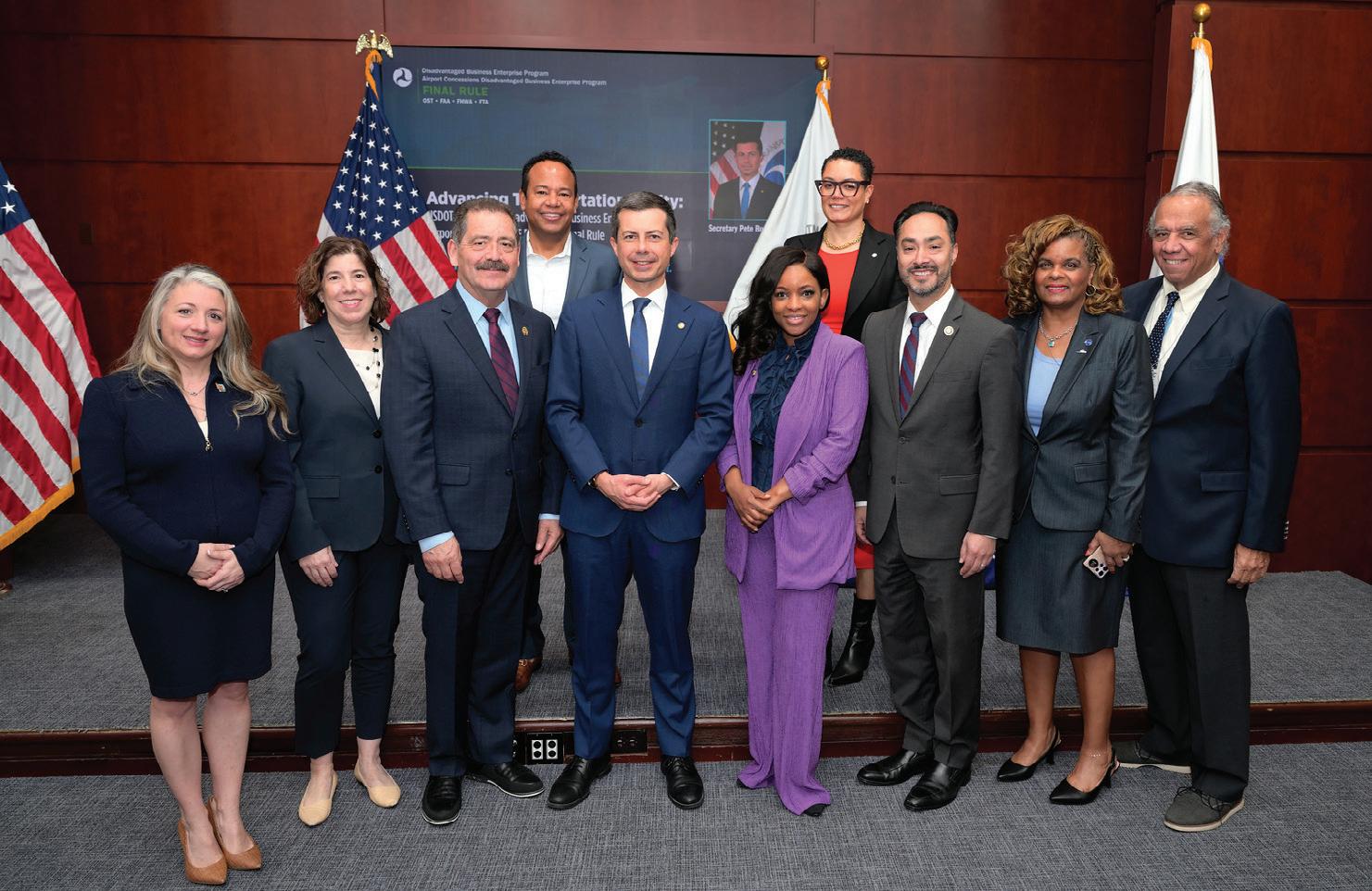


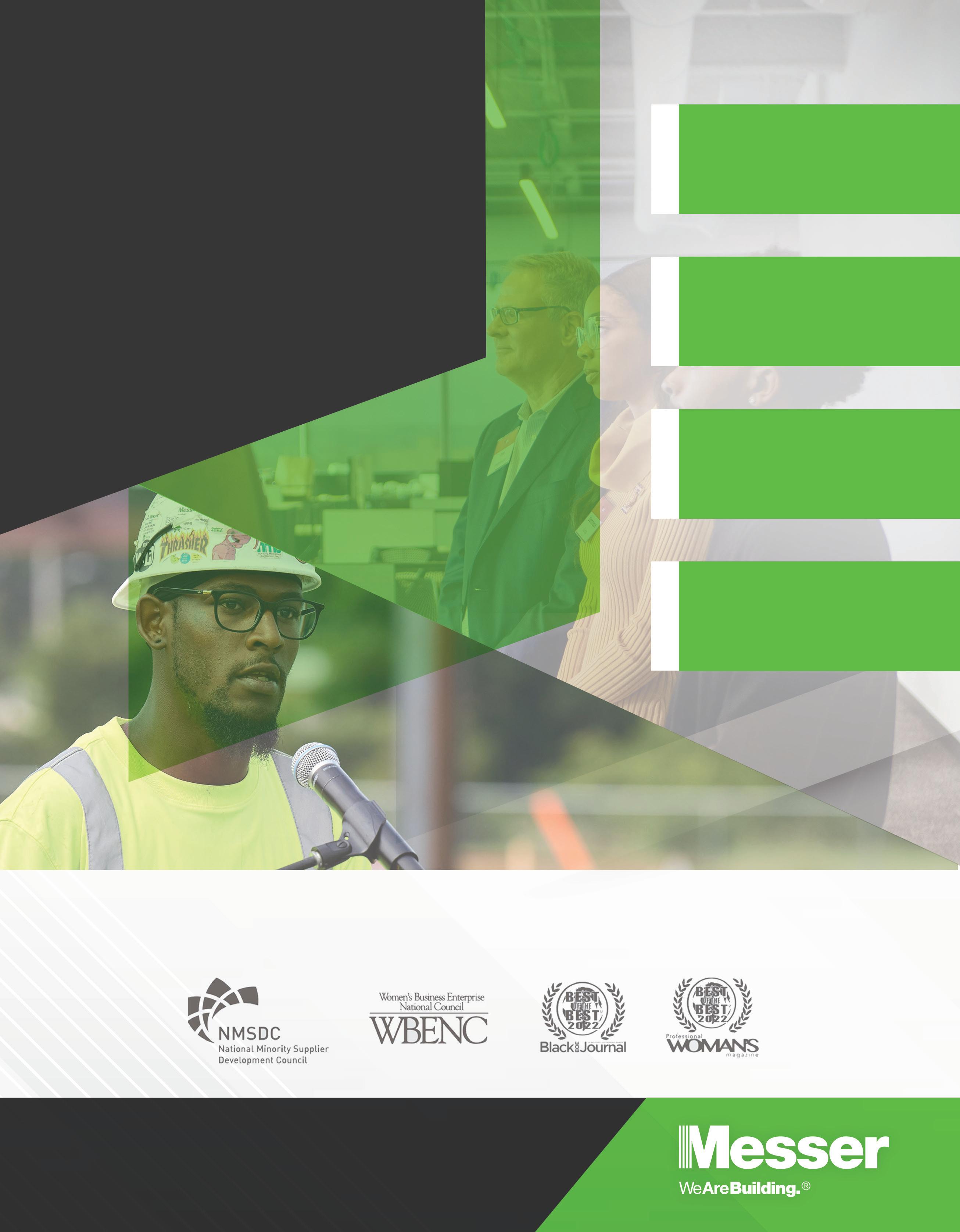
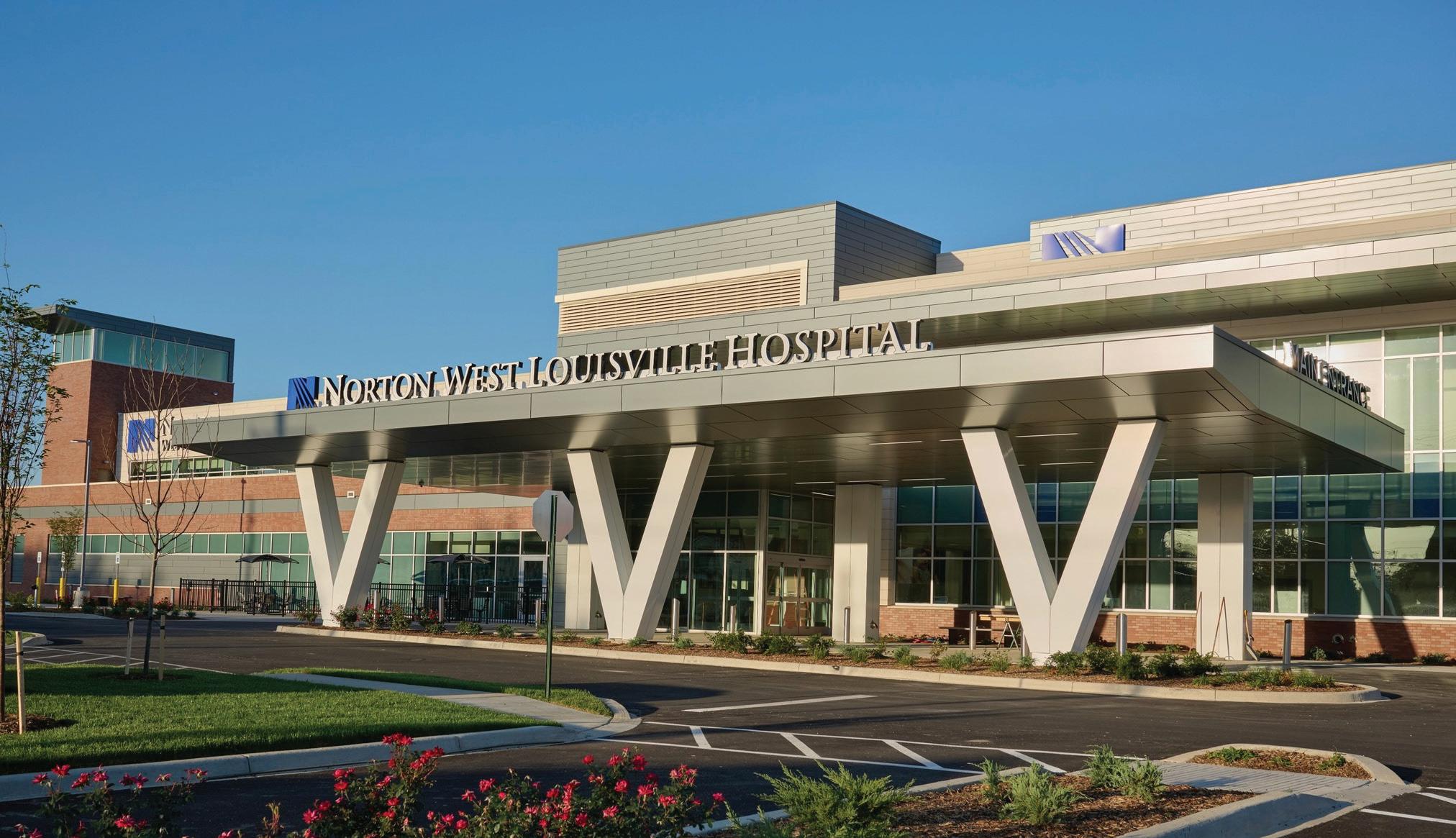
Norton Healthcare recently completed the grand opening of the Norton West Louisville Hospit a l , a f acilit y that will impr o v e healthcare access and economic opportunity in an underserved community. The design and c onstruction of the $ 90 million proj ect rep re sen ts th e culm ina tio n of a comprehensive plan to include the West Louisville community in building the facility and maximizing opportunities for community members.
Norton Healthcare (Norton) is a Kentuckybased healthcare services organization headquartered in Louisville It operates nine hospitals in the Greater Louisville region and over 400 care locations across its entire footprint in Kentucky and Indiana. Despite this substantial coverage, Norton decided in 2022 to address a longstanding need in the central core of Louisville that healthcare providers have neglected for decades a hospital in the West Louisville community.
The historic West Louisville communit y is an area where African Americans were

first able to gain housing and has been the base of the Black community since the early 1900s. Despite a long and proud history, the community has suffered from disinvestment from both local government and private investors and now suffers the effects of urban blight, which is indicative of many predominantly African American communities in urban centers across America.
Today, the area faces high unemployment ra
ill eff ects of a communit y in disrep air. Disinvestment in the area has also impacted access to the healthcare services available to community residents. “This is a population of need. Studies have shown that citizens of West Louisville have a life expectancy ten years lower than residents of other parts of Louisville,” Norton Healthcare Chief Administrative Officer Corenza Townsend said.
Norton reversed this history by opening the first hospital located west of Ninth Street after more than 150 years. The hospital is dedicated to serving the community and
improving healthcare access to all community members regardless of race, income, or economic status. The hospital opened to the community in November 2024, offering a wide range of medical and health services to an area needing more investment and support.
Goodwill Industries of Kentucky partnered with Norton to build the hospital as a part of the larger Opportunity Campus located at the int er section of 28th Street and Broadway. Comprehensive services at the hospital include adult and pediatric primary care provider offices, an emergency room, inpatient care, and outpatient functions. Imaging services, including X-rays and CT scans, are available, along with specialty care including women’s health, cardiology, neurology, and endocrinology. “The campus serves as an oasis for health, wellness and opportunity,” Norton Healthcare SVP and Chief Marketing and Communication Officer Renee Murphy said.
Executive leadership of Norton recognized the project offered an opportunity to improve the economic health of the West Louisville
Norton Healthcare Chief Administrative Officer Corenza Townsend (left) and Anthony Mathis, Norton Healthcare’s System Director for Sustainability and Supplier Diversity (right), stand proudly at the construction site of the Norton West Louisville Hospital. Their leadership played a crucial role in ensuring the hospital’s development prioritized community inclusion, economic opportunity, and healthcare accessibility for West Louisville residents.
communit y e v en before opening to the public The project offered employment workforce development opportunities for area residents, contracting opportunities f or minorit y -owned busines ses, and opportunities f or a ll residents of the community to engage in the planning, design, and construction of the facility Norton aimed to ensure this project was not like many urban projects that happen in underserved communities but only offer limited economic opportunities to community members.
One of Norton’s primary objectives was to ensure the inclusion of West Louisville community members in the project workforce Norton encouraged the Harmon-Messer JV general contracting team to partner with the Kentuckiana Builds workforce de v el opment pr ogr am. The program is a six-week construction sector training and job placement initiative delivered by the Louisville Urban League (Louisville, KY) and KentuckianaWorks with support from the Kentucky Cabinet for Education and Workforce Development.
Messer Construction used its own Urb an W orkf orc e De v el opment Initiative (UWDI) in combination with the Kentuckiana Builds program to create a comprehensive approach to offering residents of the surrounding community meaningful employment opportunities on the construction
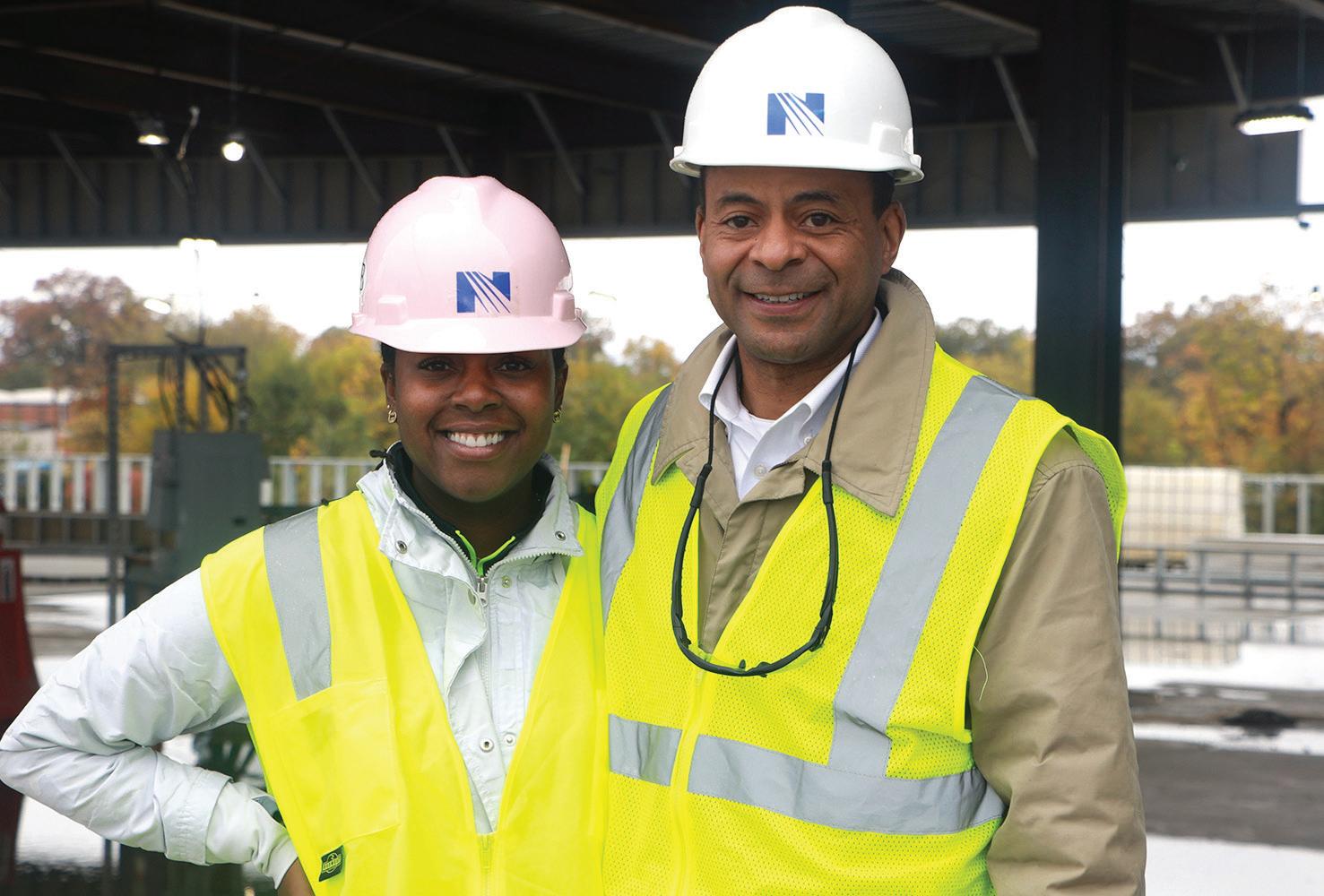
project. The collaboration made it possible to achieve 47% minority/female workforce participation, giving workers valuable technical trade skills that will set them up for future success long after the project is complete
NTC, a local minority women owned company was also on the project, implementing their Second Chance Workforce Program, providing jobs
to previously incarcerated individuals who needed an opportunity to prove themselves, gain valuable skills, and earn a living. Eight participants in the Second Chance program worked on the project providing work zone traffic control services.
“We wanted the construction site to look like the community where the hospital is located,” Anthony Mathis, Norton Healthcare’s system
A moment of celebration and unity as community members, local leaders, and Norton Healthcare executives gather for the grand opening of the first hospital in West Louisville in over 150 years. The project emphasizes inclusivity, workforce development, and a commitment to advancing healthcare equity. (photo courtesy of Norton Healthcare)
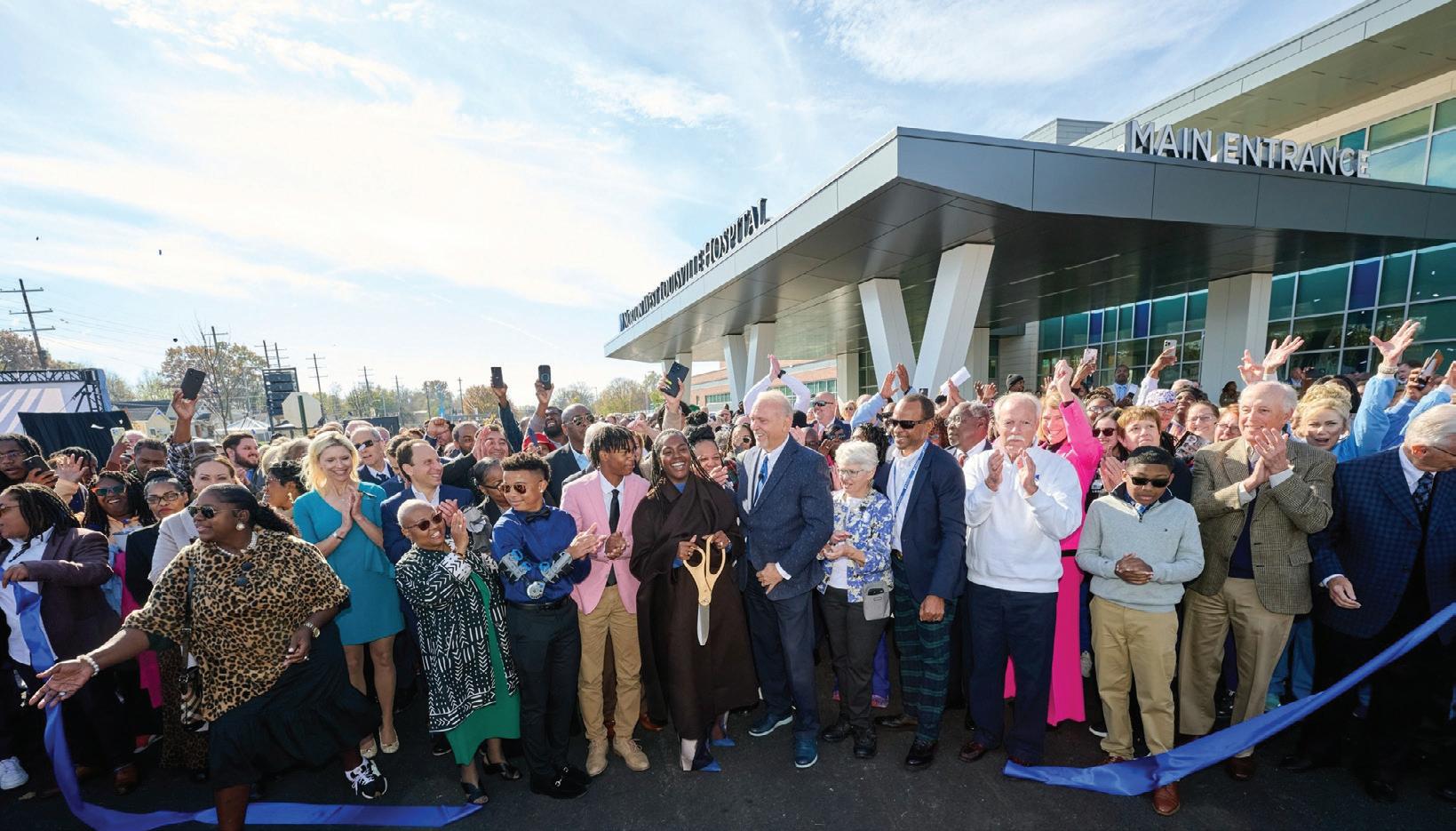

director for sustainabilit y and supplier diversity said. Mathis acknowledged that in the past, the community has witnessed other significant projects happen in West Louisville that still excluded members of the community. Mathis believes that the engagement of Norton leadership, the general contracting team, and community partners helped the project maximize opportunities for community members.
Another objective of Norton leadership was maximizing opportunities for small businesses owned by minorities and women to participate in the project. Norton led the charge with the contracting team in reaching out to diverse companies capable of contributing to the project and creating successful partnerships. Norton engaged the services of two consulting firms, OneWest and 7PM Group, to ensure that the project maximized the engagement of the community and opportunities for diverse businesses to work on the project
This effort began with several outreach meetings to the diverse business community to educate them about the project and extend the offer to bid on contracts to work on the project The next step was utilizing the OneWest plan room, less than one mile from the project site, to offer access to training, technical assistance, and construction plans. Local small businesses were encouraged to visit the plan room to get help preparing for contracting opportunities and staying updated on the project’s progress. “The key is access,” Mathis said. “We wanted to make sure that businesses in the community had all of the information they needed to have the opportunity to work on this project.”
Another Norton team objective was to provide more than just a contracting opportunit y for diverse firms, but to also provide a vehicle for companies to change the future of their business. The project extended first-tier and second-tier contracts to several companies from the community, ranging from a painting c ontract or, a plumbing c omp an y, and African American women-owned businesses providing the port-a-potties on the project. “We worked one company and one individual at a time to create success,” Mathis said.

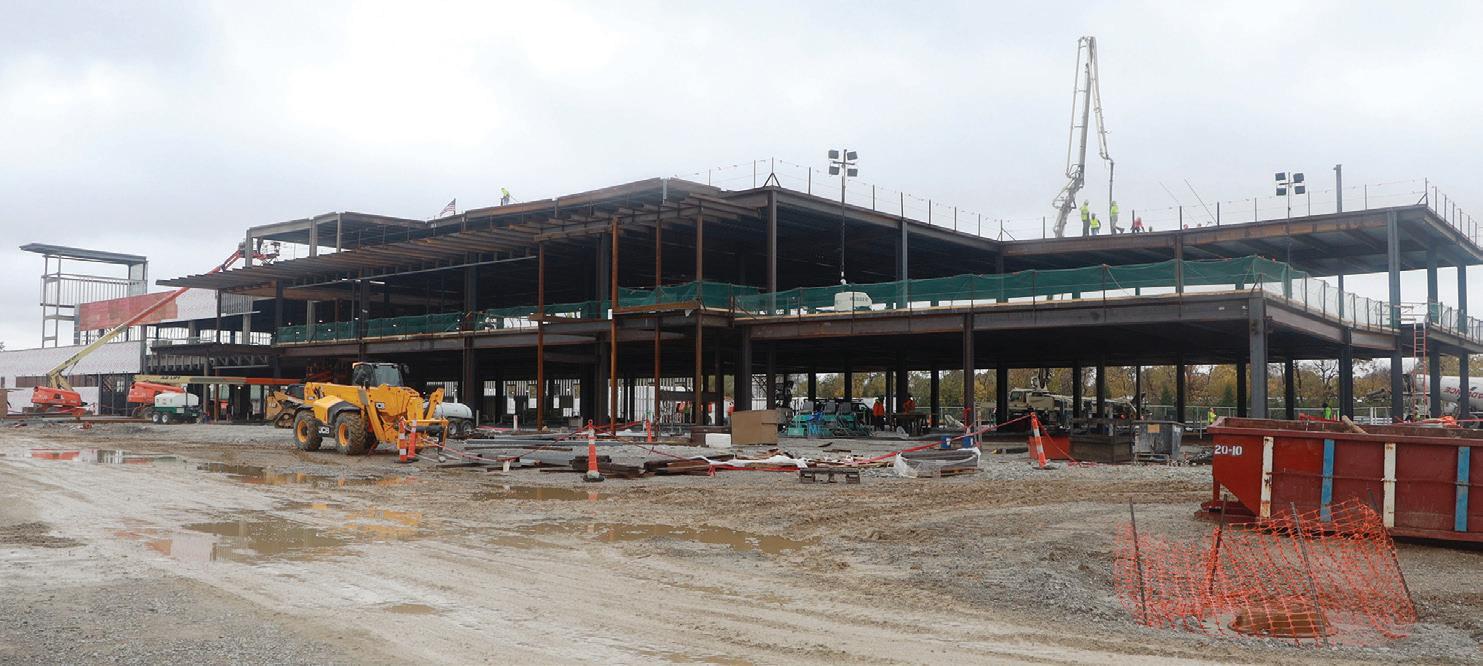
The p articip ation of minorit y -owned companies in l eadership positions was another component that set the project apart from many other pro
. Norton sel ect ed an Afric an Americ an-owned architect to lead the design of the project and selected a construction management team with a local African American-owned construction company as a member of the leadership team.
Moody -Nol an Inc serv es a s the l e ad architect for the hospital Moody Nolan is based in Columbus, Ohio, and is one of the nation’s largest African American-owned and managed design firms. The firm received the 20 21 AIA Archit ecture Firm Aw ard, the highest honor given by the American Institute of Architects, for at least 10 years of distinguished architecture Local architect Carey Anderson, the first African American architect licensed in Kentucky, was another member of the design team. Anderson was previously involved in other Norton projects,
Health Equity and the Norton Healthcare Sports & Learning Center
At the beginning of the project , Norton President & CEO Russell F. Cox said, “The new Norton West Louisville Hospital will be a unique facility that will help transform the way care is delivered in our community, and we believe Moody Nolan is the exact firm to guide this work. Their expertise in healthcare while focusing on other critical community needs, as well as their many
recognitions for developing groundbreaking spaces, make them an ideal partner for this significant project ”
team consisting of a partnership between Harmon Construction Inc . (Harmon) and Messer Construction (Messer). Harmon is an African American-owned firm with an extensive history of building construction in the Louisville area. Harmon entered a joint venture with Messer Construction to lead the construction of the hospital. Messer is also a well-established contractor in the Louisville area that has a strong record on diverse business inclusion on its projects. Messer is based in Cincinnati, Ohio, and has offices in several states including Kentucky, Indiana, Tennessee and North Carolina.
Norton leaders believe their success on this project and the success of other projects in the Norton Healthcare Goodwill Opportunity Campus will bring new life and serve as a beacon of hope to the West Louisville community. “We want to set a standard in this city for what participation and inclusion looks like. The city is watching us,” Mathis said.


www.laneconstruct.com/work-with-us/subcontractors




400+ Firms mentored by Austin have received contracts exceeding $3 billion.
Austin Commercial is committed to recognizing, embracing, and supporting workplace diversity. As a construction industry leader, Austin takes pride in creating minority economic opportunities.




ALL
• DBE & ACDBE Program and Goal Methodologies
• Compliance Monitoring and Report Development
• DBE – ACDBE Certification Support
• Airport Concessions DBE Programs
• Joint Venture Agreements
• Disparity Studies – Anecdotal Data
• Staff Development and Training
• Training via the National DBE Institute
Clients Include:
• State Highway Departments
• State and Local Transit Agencies
• Airport Authorities and City Aviation Departments



Newly Assigned to DBE/ DBELO or Certification Duties?
For you, a year-round professional development training opportunity.

“Better Professionals equals Better Programs”
Topics Include:
• Functional Understanding of DBE/ACDBE Programs
• Requirements for Program Admin Staff
• Goal Setting Methodologies and Program Monitoring
• Understanding Joint Ventures in ACDBEs
• Developing Outreach Programs
Please
• Minority / Women / Disadvantaged Business Programs
• Affirmative Ac tion and Compliance Consulting and Training
• Disparity and Availability Studies
• Speaking and Presentation Ser vices
• Exper t Witness Ser vices
• General Counsel to Americ an Contrac t Compliance Association



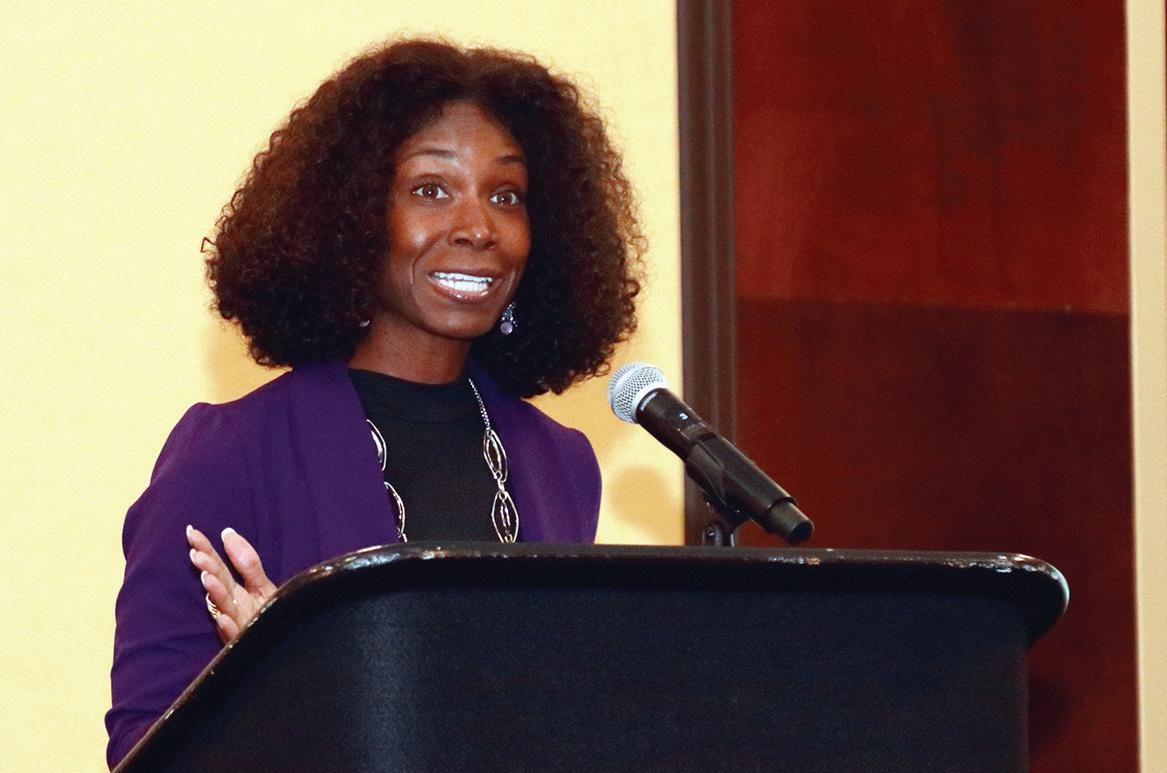
Tennessee Department of Transportation
Civil Rights Director Jessica Starling strives to move TDOT’s DBE Program forward in the face of legal challenges and updates to the program’s governing regulation – Title 49 of the Code of Federal Regulations Part 26. The strategy for moving forward includes expanding opportunities for businesses owned by minorities and women by reaching out to capable firms across the state to educate them on the many contracting opportunities available in the infrastructure industry and providing them with impactful supportive services once they get involved in the program.
Starling recognizes the concern of many DBE business owners in the current legal environment, where challenges to the program are gaining traction in the courts, and some private and public organizations are cutting back on Diversity, Equity and Inclusion (DEI) initiatives. in fear of future legal sanctions. “Our DBEs are definitely concerned, but we are telling them that until the law forces us to change, we are going to keep setting project goals and moving forward,” Starling said.
Legal challenges to the DBE Program have not reduced the need for capable contractors to address infrastructure improvement needs in Tennessee. TDOT is experiencing increased

projects based on federal funding from the Bipartisan Infrastructure Law and additional funding for infrastructure projects through passing the Tennessee Modernization Act in 2023. The new legislation provides a $3 billion one-time transfer from the state’s general fund to support infrastructure needs. This funding gives a jump-start to the state’s 10-Year Project Plan, which identifies $15 billion in projects over the next decade. “We are focusing on outreach right now to
find more businesses capable of working on these projects because there is a lot of work coming up,” Starling said.
One area of increased opportunity is providing professional services in civil engineering, planning, construction inspection, and surveying. TDOT doesn’t currently set DBE goals on its professional services contracts, but Starling is working with TDOT leadership

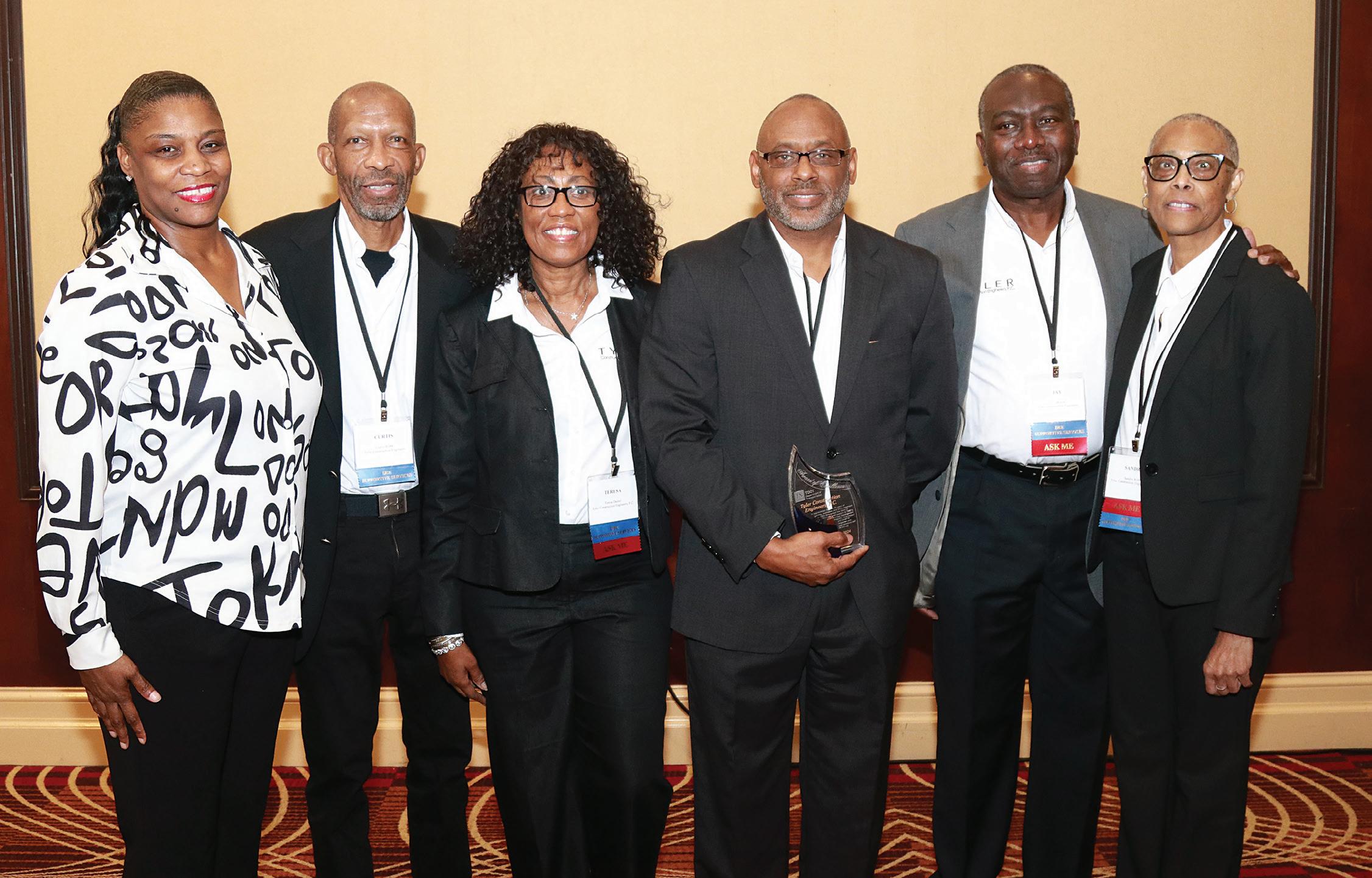
to change this policy. “We have been working on it for a while, and we hope to begin putting goals in our professional services project this year to provide more opportunities to DBEs that provide those services,” Starling said.
Starling is excited about the new DBE Final Rule announced in April 2024 and believes there are modifications to help the program advance. One change is increasing the personal net worth limit to $2.047 million, allowing DBE business owners to grow and improve their capacity without fear of exceeding the previous $1.32 million limit. Another change is expanding and clarifying interstate certification requirements to allow DBE firms to move into other states with fewer hurdles and bureaucratic challenges than before.
However, she recognizes that some rule changes will increase the administrative burdens on the transportation agencies responsible for administering the program revisions. For instance, Starling is collaborating with colleagues from other state transportation agencies to develop strategies to collect bidders list information from highway contractors to adhere to the new DBE Rule’s requirement to collect detailed information during the bid process. “I’m hearing some great suggestions from some of my colleagues in other states, but each state will have to figure out what will work for them,” Starling said.
Another challenging area of the new DBE Final Rule concerns how states will modify their “DBE Directory” to collect and distribute additional information on each DBE firm as required by the new DBE Rule. States now must include business descriptions and
website information for each certified firm. Although these changes are manageable, Starling recognizes that her staff is already stretched thin and could be stretched further to effectively implement all the rule changes. “I am still wrapping my head around how we will get it all done, but these changes will certainly help DBEs get more business,” Starling said.
DBE practitioners from several states met in April 2024 at the Southern Transportation Civil Rights Executive Rights Council Training Symposium. At the event, participants heard directly from USDOT representatives about the DBE rule changes and discussed strategies for effectively implementing the new legislation. A key takeaway from the discussions was that agencies would have support from the Federal Highway Administration to address issues and find solutions to implement the new regulation.



Supplier Diversity Programs
DEI Programs & Action Plans
Small & Local Business Programs
Labor Compliance Services
Certification Services
Software Implementation
Celebrating 25 Years of Compliance Excellence
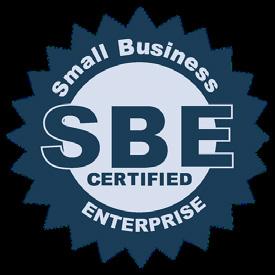
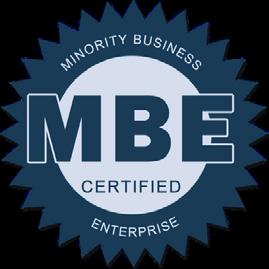
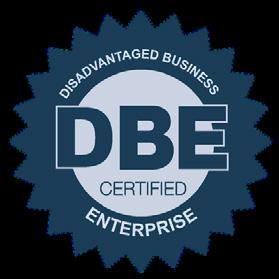
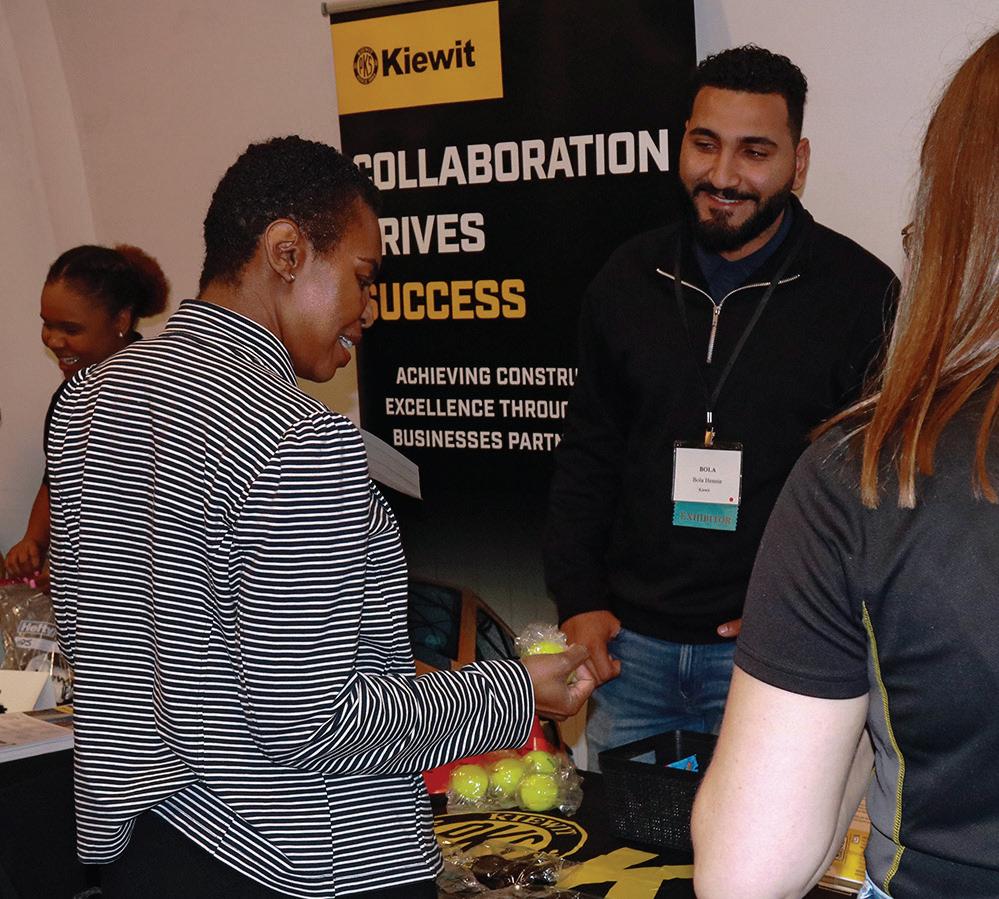
years ago and have helped firms grow from start-up to multimillion-dollar companies,” Tyler Construction Engineers President &

Slade Land Use, Environmental, and Transportation Planning, LLC (Slade) CEO
L’Tryce Slade has been an achiever since childhood in the small town of Ahoskie, N.C. She remembers being recognized by her school and local newspapers as a young person destined to do great things in the future. Her desire to reach her potential led her to pursue two bachelor’s degrees at the University of North Carolina at Chapel Hill and a master’s degree and law degree in her early adult years. Along the way, she had no idea her path would lead to entrepreneurship, and this is where she would face some of her biggest challenges while leading to her higher achievements.
L’Tryce launched Slade in 2003 as a consulting firm based in Birmingham, Alabama, providing environmental and safety consulting services. She opened the firm out of necessity after being laid off from a law firm after she was unable to pass the bar exam, which was a contingent component of her employment. “I couldn’t find a job. I was too qualified for many positions but still needed to support myself, so I started the company,” she said. While her family supported her decision, they were initially concerned about her future security. “My family thought finding a job would be a safer bet, but I had to play the cards I was dealt,” she added.
Today, Slade is a multifaceted firm offering a wide range of services, including general contracting, environmental services,

construction material testing, geotechnical services, and urban planning. The company has been involved in high-profile projects such as the modular expansion of Concourse D at Hartsfield-Jackson Atlanta International Airport and infrastructure improvements for the Metropolitan Atlanta Rapid Transit Authority (MARTA). These projects reflect the firm’s ability to handle complex, large-scale challenges with precision and professionalism.
“It’s a big project for us. People have told me we are the only firm owned by an African American Woman to have a construction material testing lab,” L’Tryce said.
Another significant project is the Metropolitan Atlanta Regional Transit Authority’s (MARTA) Infrastructure Improvement Project, where Slade provides field inspections to ensure contractors adhere to project safety policies and procedures. “Transportation is an area of opportunity for us right now. Many projects are happening, and we are positioning the company to be involved in this growth,” L’Tryce said.
Beyond these projects, L’Tryce acknowledges that maintaining the company’s high standards requires continuous professional development. “We have to stay
on top of industry certifications and training to provide the best service to our clients,” she explained. Her firm holds numerous environmental certifications that distinguish it from competitors and expand the services they can offer.
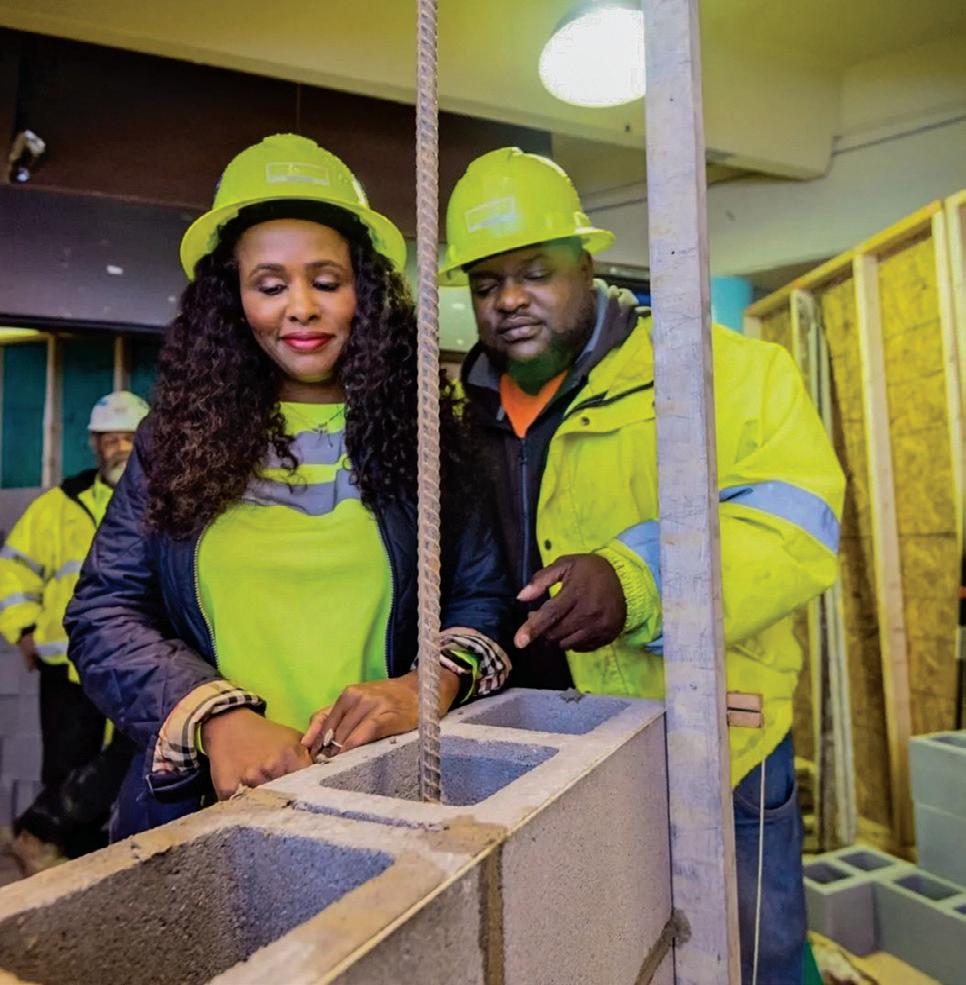
Looking ahead, Slade is poised for significant growth, with a strategic focus on aviation, utility industrial projects, and municipalities. “These sectors align perfectly with our strengths and offer immense opportunities for expansion,” L’Tryce said. She is also passionate about expanding into healthcare, and leveraging the firm’s background to carve out a unique position in the industry.
“Going from a one-person operation to a 12-person team has been a journey of learning and adaptation,” L’Tryce says. “I want to ensure that every team member shares my commitment to quality and integrity.” She emphasizes the importance of hiring the right people who align with the company’s mission and values. “Building the right team is crucial; it’s not just about skill but also about shared vision,” she said.
— continued

L’Tryce Slade, President and CEO of
leads the company with a commitment to excellence in construction and environmental services. (Courtesy: Slade)

As the only African American female to own a construction material testing laboratory in the country, L’Tryce has achieved a remarkable milestone in an industry where diversity is still evolving. “Many DBE firms can only provide specialized services, but we are one of the very few companies that have all of the environmental certifications,” she said.
L’Tryce is particularly proud of the opportunities Slade provides to employees seeking second chances. “If I can help save people from the economic distress that plagues our community and offer them a job so they can send their kids to school, it’s worth it for me. That is my why,” she said.
One of the company’s proudest moments was completing the Birmingham Jefferson County Transit Authority Birmingham Express Bus Rapid Transit (BRT) project in 2023. Slade provided QA/QC (Quality Assurance/Quality Control) and safety consulting services for the project, further expanding the firm’s capabilities. “This was our first time on a project of this magnitude. Completing the work combined our building background with our environmental and transportation background on one project.” L’Tryce said.
Although her firm is moving in the right direction, L’Tryce acknowledges the obstacles she encounters while growing to the next level. These obstacles include building stronger client relationships that create repeat business and allow the firm to expand the services provided to clients. Other obstacles include expanding the firm into additional market segments like healthcare, industrial (utility), and municipalities and growing these new markets while bringing on high-quality team members who can enhance the company culture.
“I think that is why I am an achiever. I just keep going; and that’s what it’s about,” L’Tryce said. With an inspiring blend of business acumen and social responsibility, she is paving the way for future entrepreneurs, proving that with hard work and dedication, anything is possible.
Reflecting on her journey, L’Tryce remains optimistic about the future. “I’m always looking for ways to grow and improve. My goal is to leave a legacy that not only builds infrastructure but also empowers communities and individuals,” she said. “It’s about more than just business—it’s about impact.”
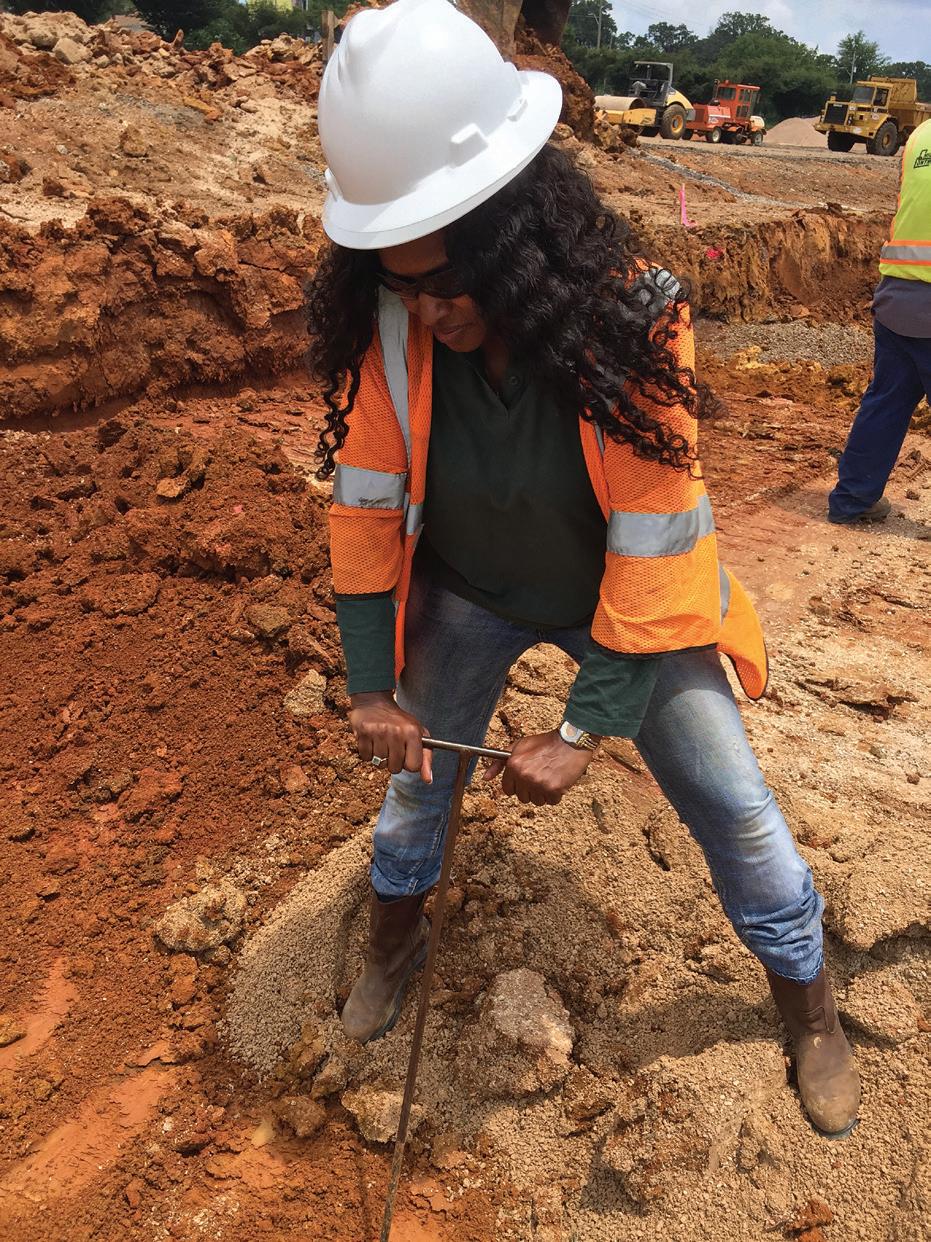
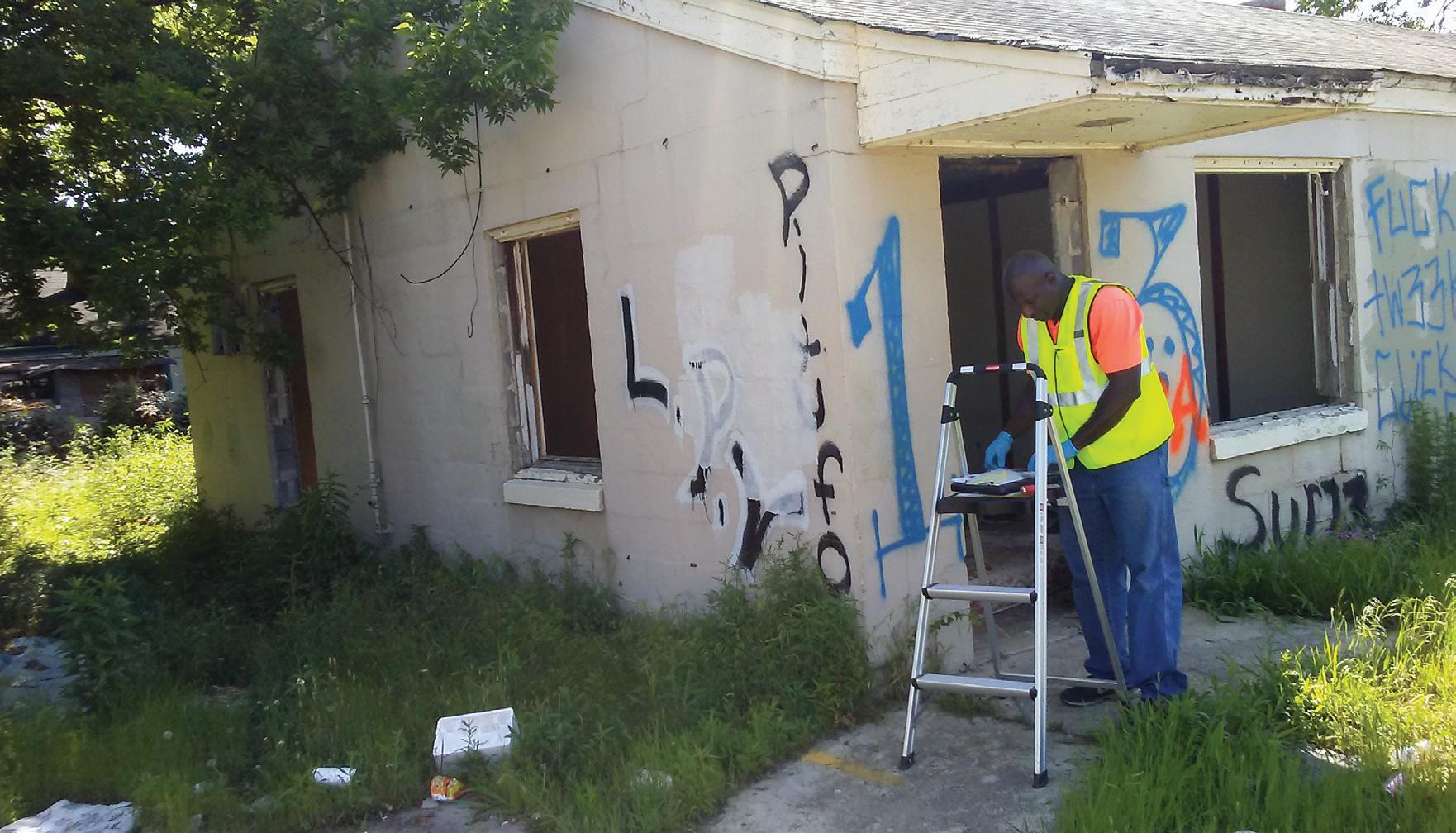

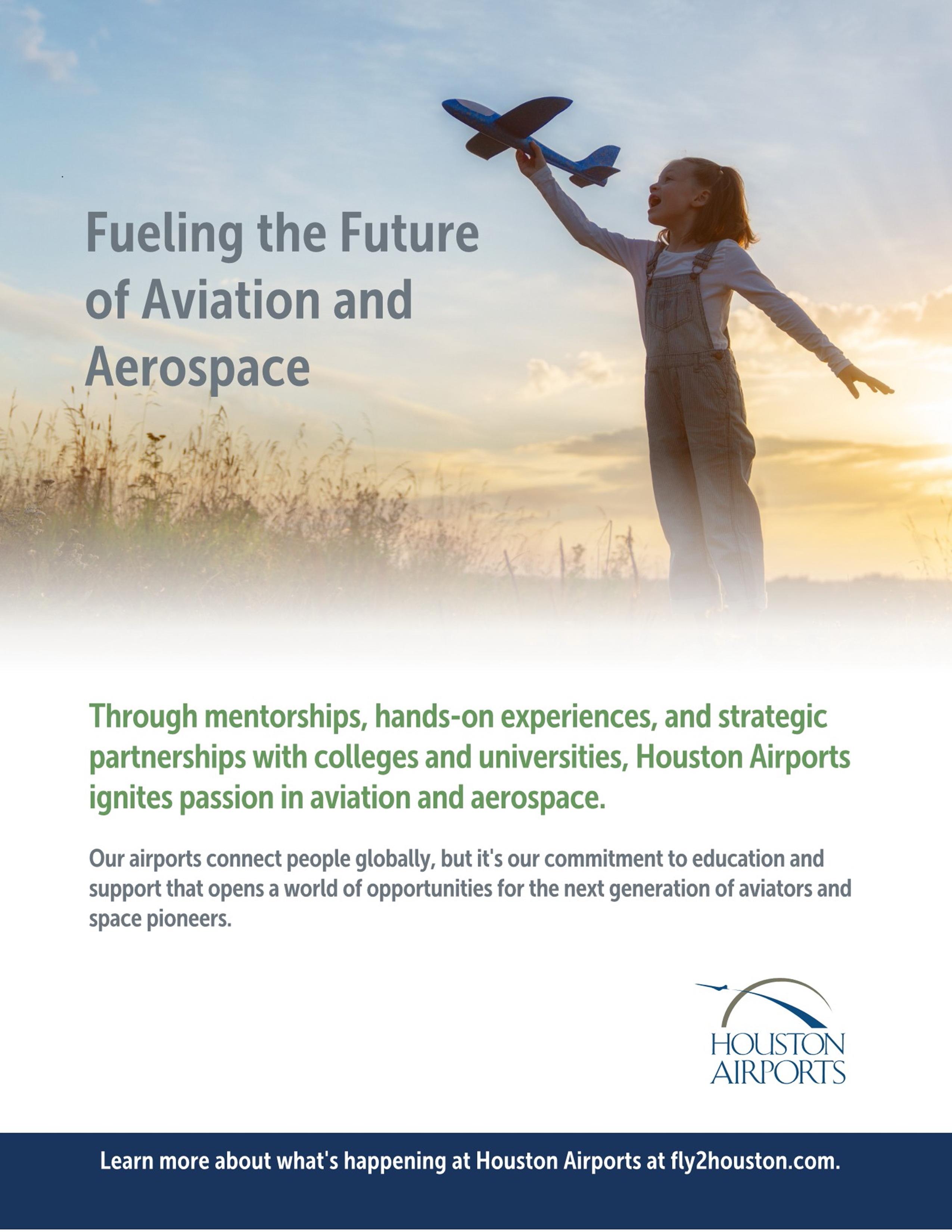
In September 2024, Los Angeles World Airports (LAWA), in partnership with Unibail-Rodamco-Westfield (URW) Airports and Delta Air Lines, celebrated the local and minority businesses powering the latest dining and retail offerings at the new Terminal 3 at Los Angeles International Airport (LAX). These include local brands such as Alfred, Fat Sal’s, Homeboy, Native by Nyesha, and Yakumi. Terminal 3 features 15 gates and serves as a hub for Delta Air Lines.
The celebration of these businesses reflects LAWA and URW’s commitment to diverse, inclusive airport concessions and raises the bar on local, minority-, and femaleowned business participation at LAX. The initiative includes 22 minority business owners working together to deliver the best guest experience for Delta’s customers. The new program is expected to achieve Airport Concessions Disadvantaged Business Enterprise (ACDBE) participation of 43 percent for food and beverage and 36 percent for retail—outperforming the initial project goals of 25 percent and 20 percent, respectively.
“Today’s celebration of LAX Terminal 3’s new dining and retail offerings is a testament to LAWA’s commitment to fostering a diverse and inclusive environment,” said Eboni Wimbush, President and CEO of the Airport Minority Advisory Council (AMAC). “By partnering with Unibail-Rodamco-Westfield and Delta Air Lines, LAWA has not only elevated the passenger experience but also empowered local and minority-owned businesses, many of whom are AMAC members. With 22 minority business owners contributing to this dynamic new space, we’re proud of LAX exceeding its ACDBE participation goals and setting a new standard for airport concessions nationwide.”

offering a flavor-packed Mediterranean menu featuring curated bowls, pitas, salads, dips, drinks, and more. Crews is also behind local favorite Fat Sal’s, known for its oversized sandwiches, loaded fries, and other comfort food classics, and Yakumi, a fast-casual sushi hotspot.
The new concessions feature a mix of local favorites, celebrity-owned restaurants, travel essentials, unique gifts, and a selection of airport firsts. Jackmont Hospitality and SoCal Concessions brought rapper Ludacris’ popular Chicken + Beer to its first LAX location. They also collaborated with local L.A. Top Chef star Nyesha Arrington to open Native by Nyesha, a go-to spot for fresh California-inspired cuisine. Native by Nyesha is the winner of the 2024 Airport Experience Award for Best Locally Inspired Restaurant.
“Our collaboration with Nyesha Arrington to develop and operate Native by Nyesha brings together two minority-owned firms to elevate the LAX guest experience,” said Daniel Halpern, President and CEO of Jackmont Hospitality. “In partnership with LAWA and URW Airports, we’re creating a more equitable and welcoming experience that truly represents the heart of Los Angeles.”
“This project, in partnership with Jackmont Hospitality, is a celebration of Los Angeles’ vibrant and diverse food culture, offering travelers a taste of the city’s rich culinary mosaic,” said Nyesha Arrington, Chef Partner at Native by Nyesha. “By elevating the work of diverse chefs and incorporating multicultural dishes, we not only foster local pride but also advance our partnership to ensure that LAX reflects the voices, flavors, and traditions of all Angelenos, while supporting local businesses and underrepresented communities.”
Crews Companies, a local and minority-owned concessionaire, recently opened the one-ofa-kind Pizza Please, a ghost kitchen concept delivering pizzas through an innovative locker platform. They also introduced CAVA,
“As an L.A.-based minority-owned company with deep roots in the city, we’re thrilled to contribute to LAX’s vibrant atmosphere and provide guests with a memorable culinary journey,” said Nicholas Crews, CEO/ Managing Partner of Crews Companies. “Our long-term partnership with URW Airports, LAWA, and Delta Air Lines aligns perfectly with LAWA’s steadfast commitment to inclusivity and supporting local businesses. Our innovative dining hall concept in Terminal 3 showcases a unique blend of local and diverse culinary offerings. By bringing together four beloved brands –CAVA, Fat Sal’s, Yakumi, and Pizza Please – in two spaces, we’re providing guests with an exceptional dining experience.”
The local and minority business owners, prime operators, and joint venture partners operating in Terminal 3 include:
• Luis Arandia (Arandia Designs – Hudson)
• Blanton Canady (BTII Incorporated –Concorde Collective)
• Joya Kizer-Clarke (Casa Unlimited Enterprises – Marshall Retail Group)
• Dale Mason Cochran (Concourse Ventures – Hudson)
• Harry E. Johnson (Creative Concourse Concessions – Areas)
• Sharon Jackson (Delightfully Different and Wholesome – Marshall Retail Group)
• Gregory Plummer (Concord Collective)
• Devika Maini (Fly Away Foods)
• Emma Walbridge (Gameway)
• Daniel Halpern (Jackmont)
• Javarro Edwards (JME Group – Concord Collective)
• Julie Jun (MAJ Collection – Hudson)
• Randi Sibonga (MCSB – Concord Collective)
• Nicholas Crews (Crews Companies)
• Norman Nixon (Nixon & Associates –Hudson)
• Sandy A. Roberts (Onsite Retailers –Concord Collective)
• Simeon Stewart and Michael Washington (Palazzo Concessions – Hudson)
• Robert B. Crews, III (RC3 Enterprises – Crews Companies)
• Shannon Westmore (Space B/D – Marshall Retail Group)
• Karim Zaman (The Zaman Group – Hudson)
“We’re excited to offer LAX guests a range of unique, locally inspired experiences while supporting the growth of remarkable businesses,” said Karim Webb, President of the Board of Airport Commissioners.
John Ackerman, Chief Executive Officer of LAWA, added, “As the international gateway to Southern California, LAX should reflect the vibrant diversity of Los Angeles, and this includes the dining and retail offerings available to our guests. Los Angeles World Airports is thrilled to celebrate the inclusivity showcased in Terminal 3 at LAX and proud that this vision was realized by Angelenos and community members for everyone who travels through our airport.”
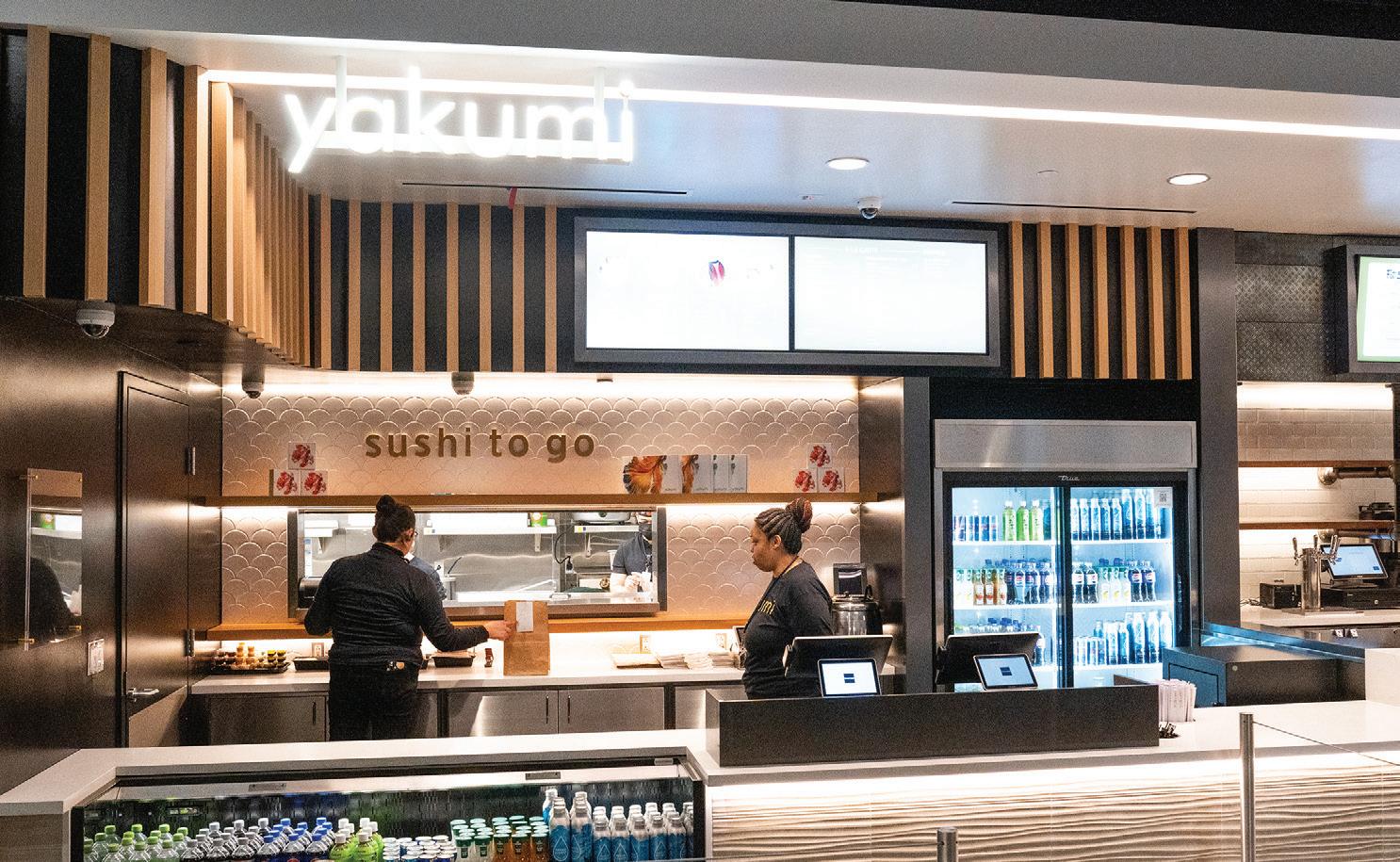
Top to bottom:
Yakumi, operated by Crews Companies, opened in 2024 in Terminal 3 at Los Angeles International Airport (LAX). This fast-casual sushi concept offers travelers a curated selection of traditional Japanese dishes, including fresh sushi and sashimi.
In March 2024, Los Angeles World Airports (LAWA), in partnership with UnibailRodamco-Westfield (URW) Airports, announced the opening of new dining and retail concepts at Los Angeles International Airport (LAX). Among these, POP SOX, operated by Marshall Retail Group (MRG), a subsidiary of WHSmith, offers travelers a curated collection of vibrant, stylish socks.
Pop Sox debuts in Terminal 3 at Los Angeles World Airports (LAWA), offering travelers a vibrant selection of socks, hats, and accessories. Operated by Marshall Retail Group (MRG), a subsidiary of WHSmith, this new concession showcases a fresh and fun shopping experience.



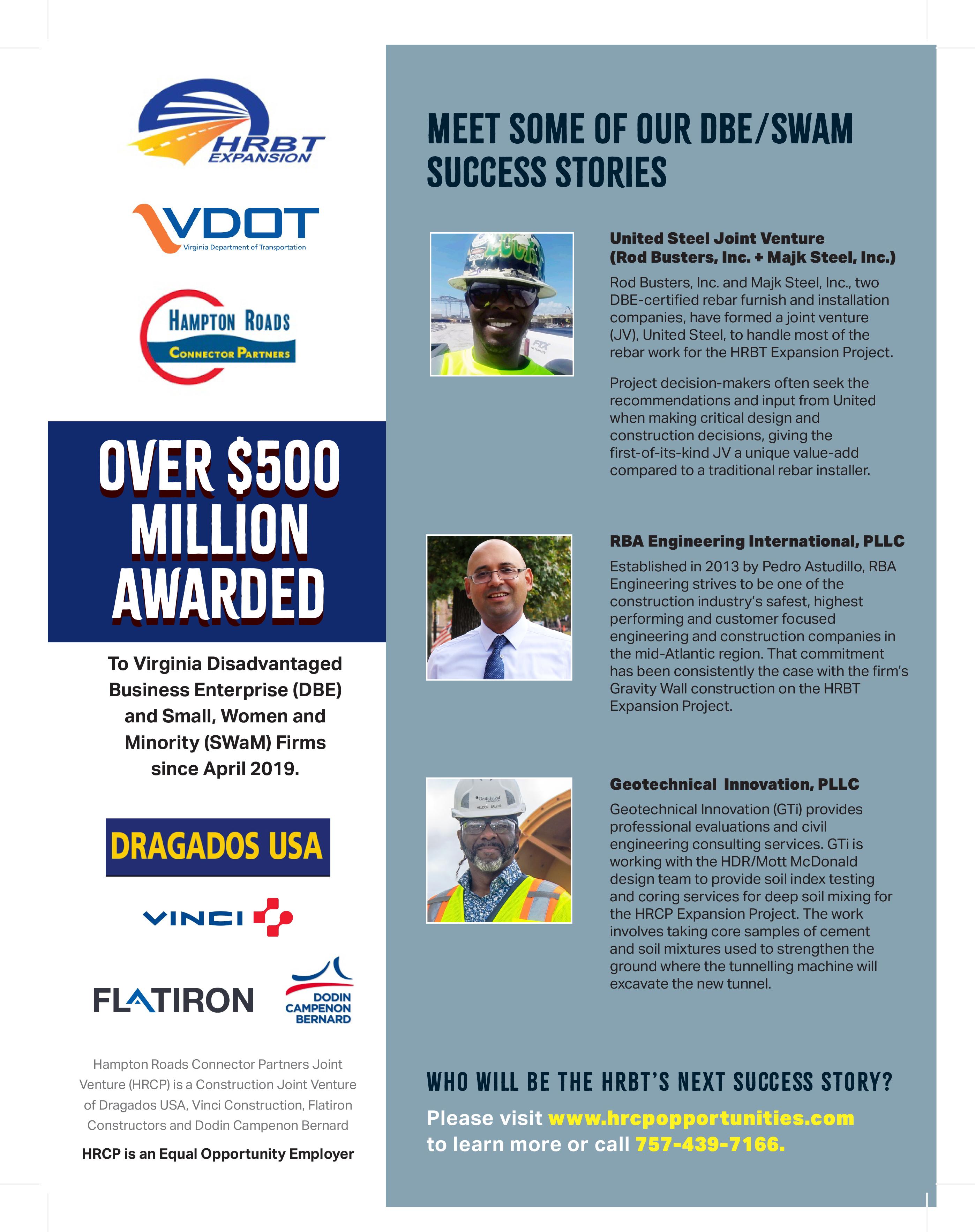
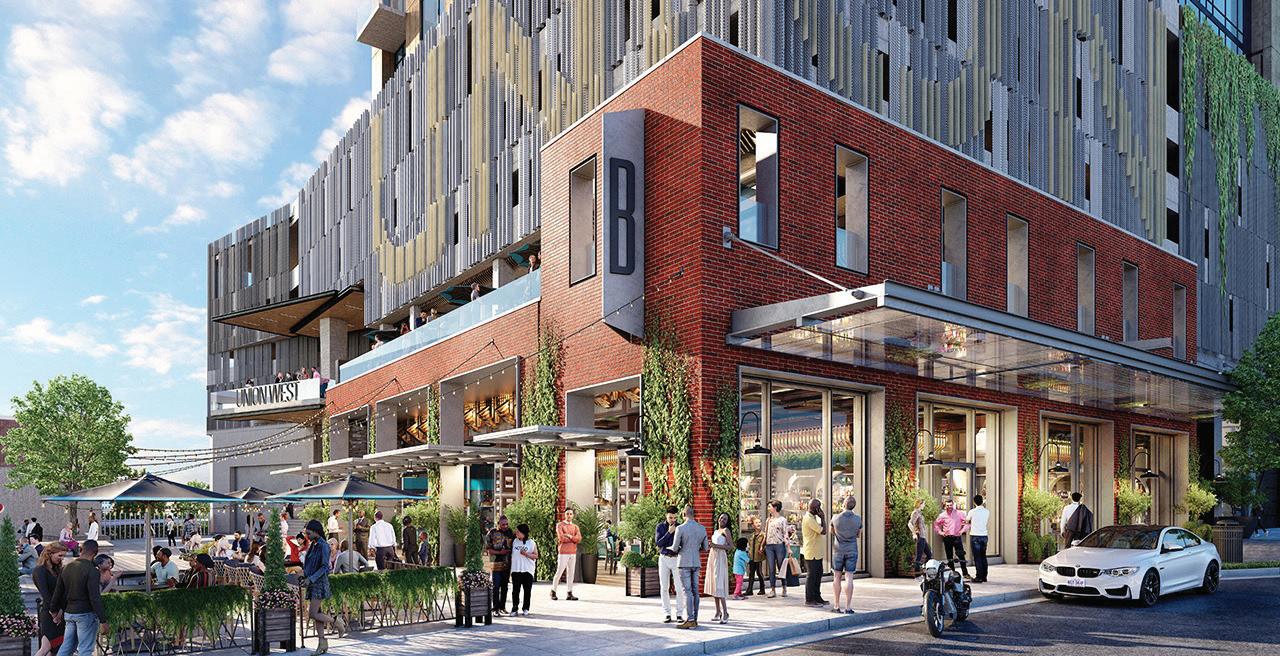
The Research Triangle Regional Public Transportation Authority, or GoTriangle, is leveraging a $20 million grant from the U.S. Department of Transportation (USDOT) to foster transit-oriented development and opportunities for Disadvantaged Business Enterprises (DBEs) through the Raleigh Union Station Bus Terminal project, called RUS Bus. The USDOT BUILD Grant is being used to complete the project and GoTriangle officials are optimistic about its potential to catalyze future development in the Warehouse District of downtown Raleigh.
The new facility represents a unique blend of a ground-level bus terminal and a highrise development, exemplifying GoTriangle’s innovative project approach. With a 99-year lease, GoTriangle’s development partner, Hoffman & Associates Inc., is set to create 500,000 square feet of mixed-use space, incorporating retail, residential, and hospitality offerings. At full buildout, development plans include 18,000 square feet of retail space, 200 hotel rooms, and
over 400 multi-family apartments, some of which are designated for affordable housing.
One federal grant requirement is to provide opportunities for DBEs. GoTriangle set a 12.0% DBE goal for the $39 million project. The project began with Phase I in 2020, involving the demolition of an existing structure and site preparation. Phase II commenced in 2023, focusing on constructing the bus terminal facility and related infrastructure improvements to support the eventual development above the terminal. “We achieved 33% DBE participation on Phase I contracts, and currently, we’re at 18% participation on Phase II, about 5% ahead of the goal,” said Rick Major, GoTriangle’s Director of Capital Development.
Under the leadership of Former President and CEO Charles Lattuca and the Board of Trustees, GoTriangle is actively engaged in the success of the DBE Program. Leadership’s engagement is demonstrated by requesting quarterly updates on progress toward
Featuring
meeting the agency’s Overall DBE goal and on the status of significant capital projects like RUS Bus. “Our board of trustees and executive leaders place a high level of importance on the DBE Program, and it is showing in the results we are seeing,” Major noted, emphasizing the role of leadership in the program’s success.
Major collaborates closely with Jamila Ormond, GoTriangle’s Director of Equal Opportunity, Diversity, and Inclusion, and
— continued

the agency’s designated DBE Liaison Officer. Ormond oversees GoTriangle’s compliance with the Federal Transit Administration’s DBE Program requirements. She joined GoTriangle in August 2023 and has worked with her team to revitalize the DBE Program. “I look forward to collaborating with GoTriangle stakeholders and interested businesses to further implement the agency’s DBE Program, with the ultimate goal of removing barriers to DBE participation and assisting the development of DBE firms that can compete successfully in the marketplace,” Ormond said.
DBE Innovation Adds Value to RUS Bus
Reaching out to DBEs for contracting opportunities on the RUS Bus project increased participation by diverse firms and helped achieve project goals. This outreach also led to innovative cost-saving measures for GoTriangle and Hoffman & Associates. The project general contractor, John Moriarity & Associates, hired Roadworks Construction to complete site clearing and grading after the demolition phase. During their work, Roadworks identified a costsaving measure to reduce the amount of concrete waste materials leaving the project by using a machine to grind up construction materials for recycling into the new terminal’s foundation concrete. This innovative solution demonstrated Roadworks’ commitment to sustainability while adding significant savings to the project. “We utilized a machine we already owned to recycle the bricks and concrete from the demolished building, reducing the need for material removal and new concrete production,” said Roadworks Construction President Cheryl Biagini.
GoTriangle is achieving similar success on the Bus Stop Improvement Program, another project receiving funding from the Federal Transit Administration. In 2018, the agency received its first FTA grant to fund the addition of benches and shelters to bus stops across Durham County. Since then, the agency has awarded nine contracts totaling over $5 million to contractors for upgrading bus stops. All but one of these contracts were awarded to certified DBE firms. The program

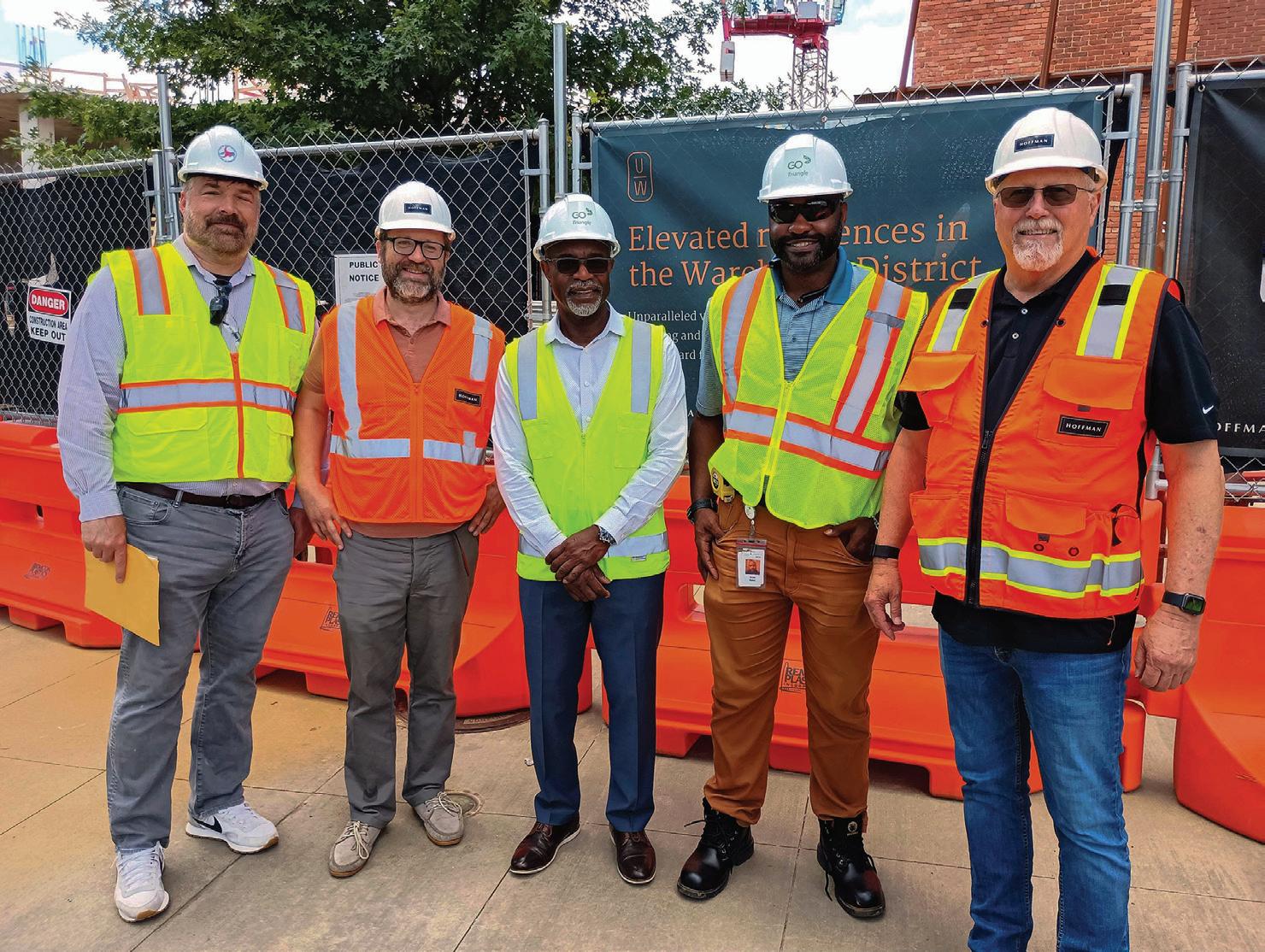
covers 572 bus stops, with 133 completed and 439 in various stages of planning, design, permitting, or construction.
GoTriangle’s success with this program stems from intentional outreach to firms, educating them about opportunities, and hosting pre-bid workshops to ensure contractors understand project requirements and can provide accurate bids. “We believe these contracts are ideal for DBE firms because they involve manageable projects with concrete work, small structures, and benches,” Major said. The Bus Stop Improvement Program has recently expanded to include stops in Wake County, N.C.
Efforts to increase inclusion and opportunities for DBEs are preparing GoTriangle for its most significant capital development project: a new Transit Mobility Hub in the Research Triangle Park area. The project is in the preliminary stages, with plans for a multi-modal transit hub adjacent to an Amtrak rail station to connect several transit systems and link to intercity rail services. GoTriangle anticipates a construction budget exceeding $50 million, which will include
federal funding and a DBE goal. “There should be many opportunities for DBEs on this project, and we are working to get companies educated about it and ready to participate when the project starts,” Major said.
GoTriangle received a $25 million grant from the U.S. Department of Transportation in June 2024 to begin development of the mobility hub. “The mobility hub will provide better linkages between local and regional bus service, on-demand microtransit, and future bus rapid transit and passenger rail projects. Relocating GoTriangle’s transit center to RTP will not only provide more efficient bus service for riders but also drive new transit-oriented development in the park,” said CEO Charles Lattuca.
The new facility will include additional covered boarding bays with electric buscharging infrastructure, covered drop-off spaces for paratransit, microtransit, and rideshare vehicles, and priority bus access. These features aim to ensure comfortable and reliable transfers for riders taking regional trips or making last-mile connections. The grant award includes funding for up to 10 new battery-electric buses to support new and expanded bus services to the mobility hub.
The Research Triangle is one of the fastestgrowing regions in the United States, and GoTriangle is committed to expanding transit options while ensuring equity and inclusion remain at the forefront of growth efforts. The agency’s board of directors and executive leadership continue to closely monitor and implement these initiatives.
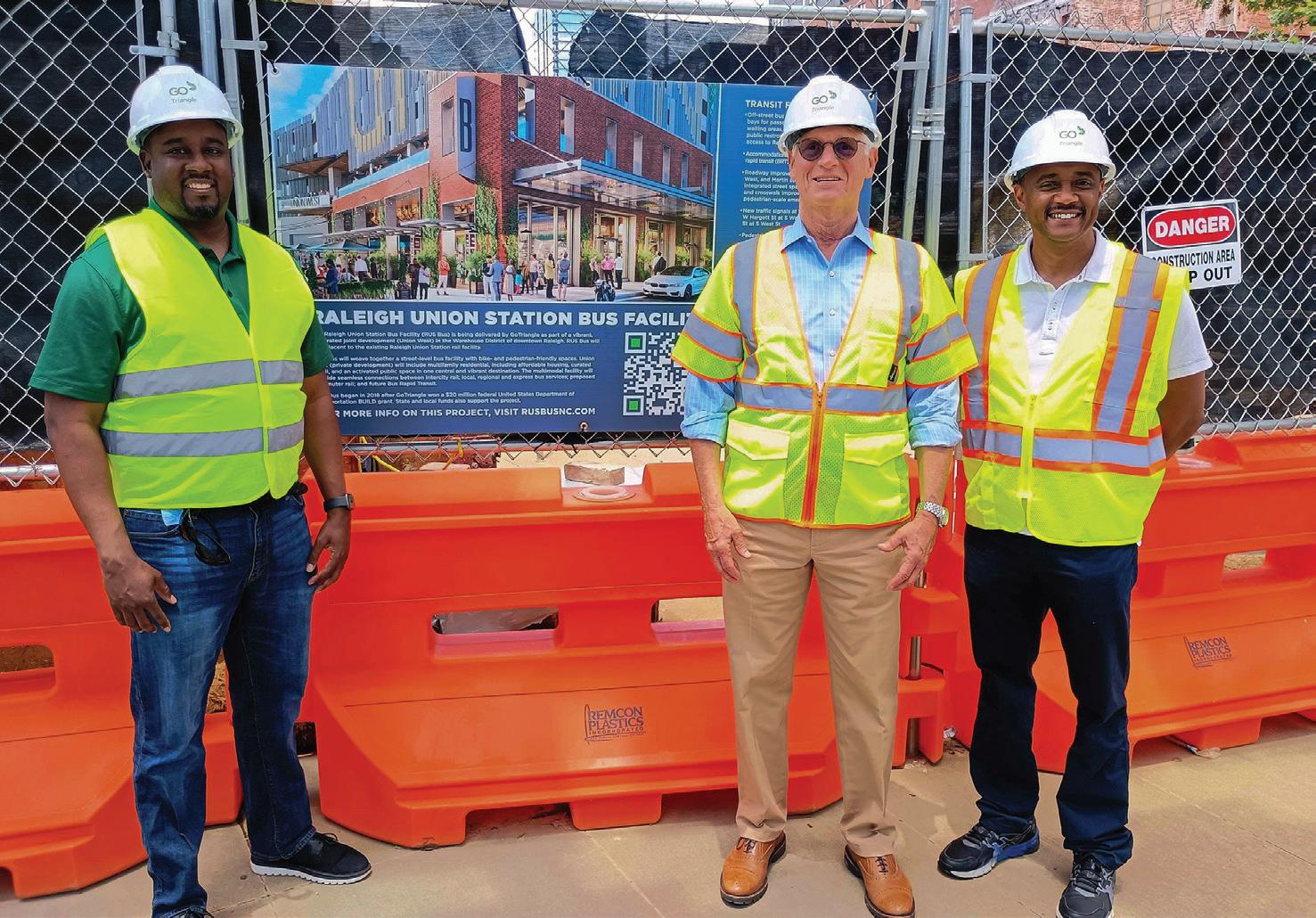
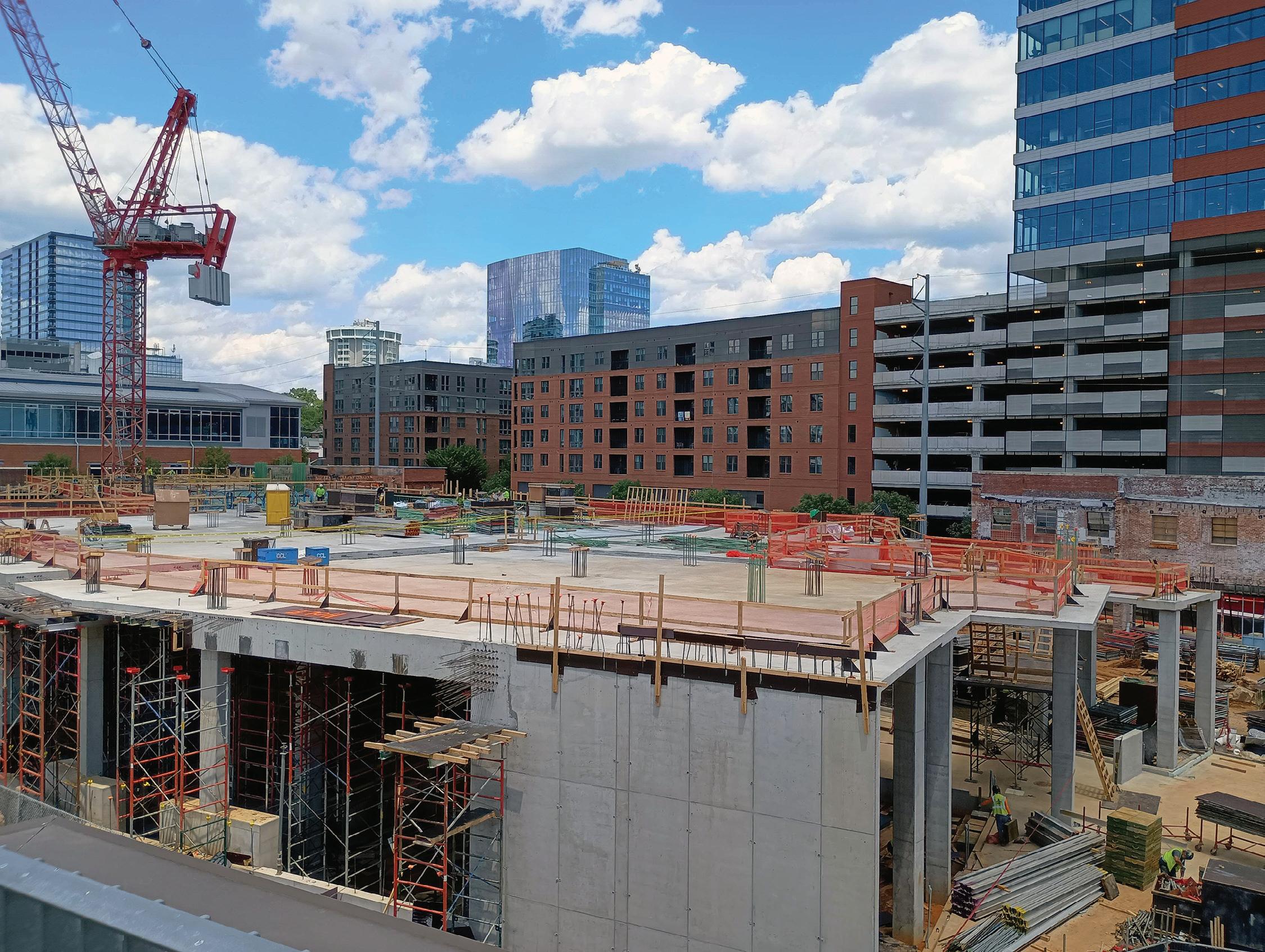




The IBR Program’s illustration of the potential Interstate 5 Bridge replacement. Three configurations will be part of the application for federal approval.
(photo courtesy of IBR Program)
The Interstate Bridge Replacement (IBR) Program has reached a significant milestone with the award of a $1.499 billion grant from the Federal Highway Administration’s (FHWA) Bridge Investment Program. This critical funding will allow the project to move forward, addressing the aging infrastructure of the Interstate 5 bridge that connects Portland, Oregon, and Vancouver, Washington. The grant, announced by congressional offices on July 12, marks a pivotal moment in regional infrastructure development.
The IBR Program aims to replace the deteriorating Columbia River crossing with a modern, multimodal corridor that enhances transportation safety, resiliency,

Replacement Program Administrator
talks with a business owner about how to get involved with the program during its November 2023 DBE Meet & Greet event at the Oregon Association of Minority Entrepreneurs headquarters in Portland, Oregon.
(Photo: Interstate Bridge Replacement Program)
and accessibility. Oregon Governor Tina Kotek praised the funding, stating, “This infusion of federal funds will promote regional and national economic growth and support local jobs and broader workforce opportunities.”
Washington Governor Jay Inslee added, “Replacing the Interstate Bridge with a multimodal crossing is one of our highest priorities, ensuring we are building a bridge for modern times.”
The Interstate Bridge serves as a critical connection between Oregon and Washington on Interstate 5, a vital trade route for regional, national, and international economies. With one span of the existing Interstate Bridge now over 100 years old, the current structure
no longer meets modern travel needs and is vulnerable to earthquake damage. Replacing this aging bridge over the Columbia River will help ensure travelers and local communities can continue to access the bridge and life-saving services in the event of a major earthquake.
IBR program officials are seeking over $2.5 billion in federal grants. In addition to the Bridge Investment Program grant, the program was awarded $600 million earlier this year through the U.S. Department of Transportation Mega Grant program. Officials are also pursuing funding through
— continued

the Federal Transit Administration’s Capital Investment Grant program. These federal investments—combined with $1 billion commitments made by each of the states of Oregon and Washington, along with toll funding—will help meet the estimated funding needed to construct the bridge and other improvements.
“This funding marks another key milestone for the IBR program. We are one significant step closer to providing a safe, multimodal, earthquake-resilient corridor that will better connect communities for decades into the future.”
This historic project not only addresses crucial transportation challenges but also creates significant opportunities for Disadvantaged Business Enterprises (DBEs). Over two dozen DBEs are already engaged in the project’s early phases, contributing expertise in areas such as engineering, environmental planning, and quality management. The program has committed to maximizing DBE participation in future contracts, reinforcing its dedication to economic inclusion and local workforce development.
The IBR Program has set a mandatory 15% DBE goal on its current consultant contract, ensuring significant opportunities for small and disadvantaged businesses. More than 28 contracts of various sizes and scopes will
be available, covering bridge replacement, transit, and roadway improvements.
DBEs are currently engaged in critical project components, including geotechnical engineering, stormwater management, CAD drafting, utilities, civil and roadway design, quality management, and transit planning. Additionally, DBEs have played a key role in strategic communications, workforce outreach, and navigating federal regulatory processes. The latest reports, as of November 2024, indicate DBE participation is tracking at 18% of expenditures so far.
Looking ahead, the IBR Program will continue collaborating with the Oregon and Washington Departments of Transportation to provide DBEs with access to support services, technical assistance, and procurement opportunities. A strategic alliance with the Small Business Administration (SBA) offers cross-referral programs to help small businesses become more competitive in the bidding process.
The IBR Program is actively working to ensure the project has a skilled and diverse workforce from all segments of the community. The organization is partnering with state building trades, workforce agencies, and contracting organizations as details of construction contracts are developed to support workforce needs. Program leaders are also hosting ongoing meetings with community stakeholders to
keep them engaged and informed about employment and training opportunities.
The commitment to a diverse workforce extends to the IBR Program’s lead agencies, the Oregon Department of Transportation and Washington State Department of Transportation. They remain dedicated to providing opportunities for the local workforce to grow and thrive, leveraging the significant economic investment to advance the region. These commitments have fostered coordination with construction and state building trades to begin developing labor agreements for future construction contracts.
The project is steadily progressing toward construction, with the environmental review process nearing completion. A Record of Decision (ROD) is expected in late 2025 or early 2026, with major construction activities projected to begin in 2027 and span over a decade.
“I am thrilled that our federal partners are choosing to invest in the IBR program to help deliver a safer and seismically resilient bridge for this region,” said IBR Program Administrator Greg Johnson. “The award of these grant dollars further cements the IBR program as a key national project for the USDOT.”




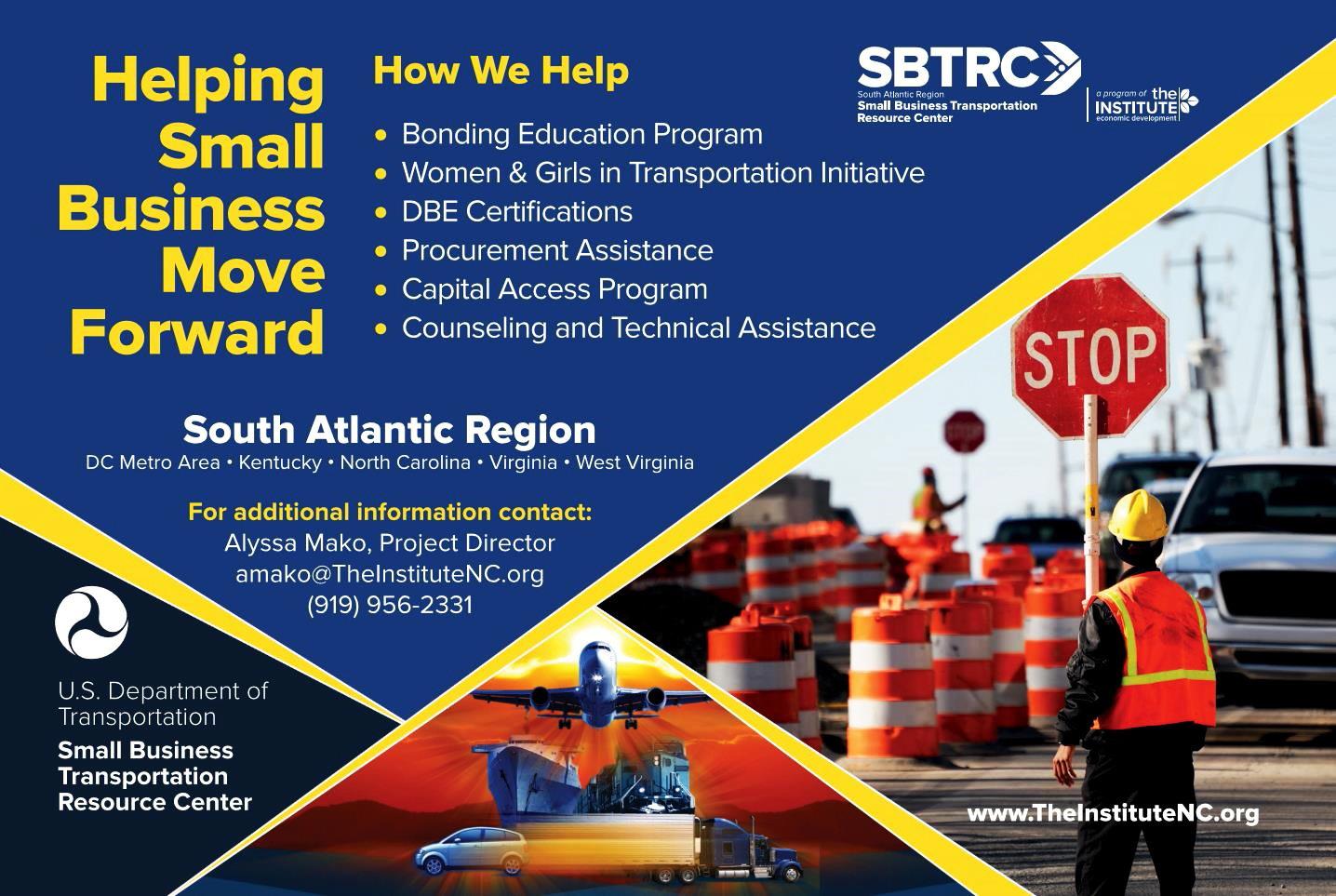

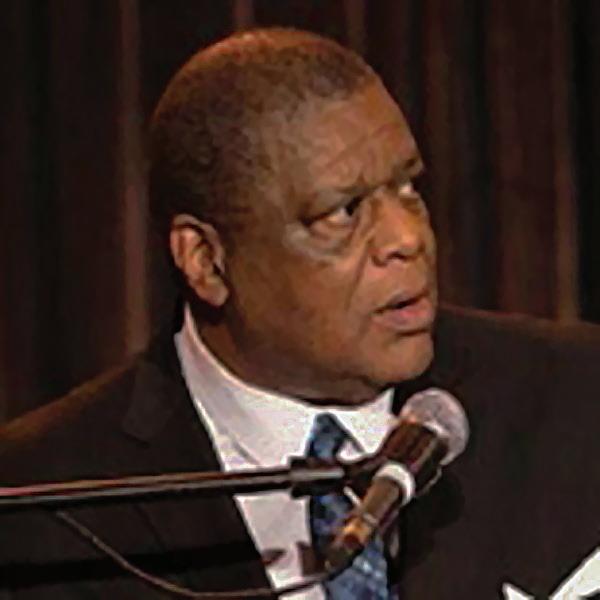
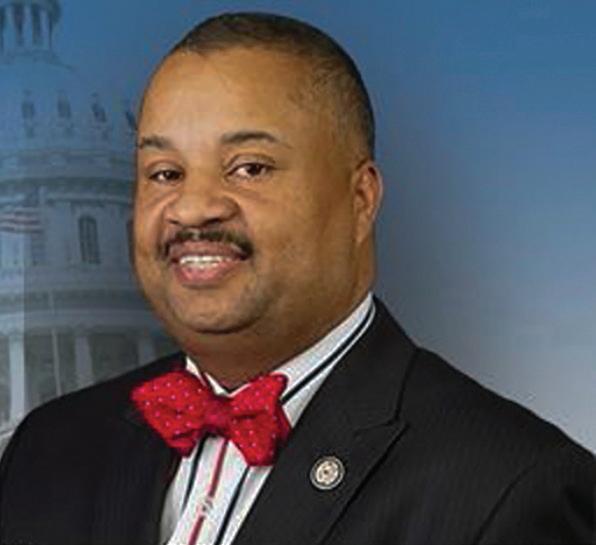
By Wendell R. Stemley, NAMC National President
The U.S. Department of Transportation (USDOT) Disadvantaged Business Enterprise (DBE) Final Rule modification introduced several positive changes. Former USDOT Secretary Pete Buttigieg sought to reform the DBE Program, even amid lawsuits in Tennessee, Kentucky, Indiana and Florida. However, some elements, such as the Biden-Harris administration’s infrastructure Minority Business Enterprise 10% goal for minority DBEs, have not advanced. Programs originally mandated by Congress over 40 years ago to address discrimination against minority, women, and other socially and economically disadvantaged small businesses continue to operate, aiming to remedy both historical and ongoing discrimination.
Under the revised rule, the Personal Net Worth (PNW) threshold has increased to $2.047 million, with no cap on personal pensions or personal residences. DBEs

are now required to calculate, report and document gross receipts on a cash basis, a shift that is expected to significantly impact DBE construction firms compared to how bonding companies operate.
Firms that were decertified or denied certification within six months prior to the effective date, due to the owner’s personal net worth (PNW) exceeding $1.32 million but remaining below $2.047 million, may submit a new PNW statement.
Certifiers issuing adverse decisions on or after the rule’s effective date must inform firms in their denial or decertification letters that the appeal period is now 45 days, reduced from 90 days. Additionally, expanded data reporting requirements will begin in November 2024.
Here is a summary of SBA NAICS industry size standards, represented in both revenue (in millions of dollars) and employee count:
General Contractors
• Highway, Street, and Bridge Construction (NAICS 237): $30.72 Million
• Building Construction (NAICS 236): $30.72 million
• Other Heavy and Civil Engineering Construction (NAICS 237): $30.72 million
• Dredging and Surface Cleanup Activities (NAICS 237): $30.72 million
Specialty Subcontractors
• Poured Concrete Foundation and Structure Contractors: $19 million
• Structural Steel and Precast Concrete Contractors: $19 million
• Masonry Contractors: $19 million
• Roofing Contractors: $19 million
• Electrical Contractors: $19 million
• Plumbing, Heating, and Air Conditioning Contractors: $19 million
• Drywall and Insulation Contractors: $19 million
• Painting and Wall Covering Contractors: $19 million
• Flooring and Tile Contractors: $19 million
• Site Preparation Contractors: $19 million
NAMC recognizes the efforts of the late Congressman Donald M. Payne, Jr., who served as Chairman of the Subcommittee on Railroads, Pipelines, and Hazardous Materials under the House Committee on Transportation and Infrastructure. He advocated for improved participation of minority and women-owned businesses in federal transportation projects.
Rep. Payne hosted a roundtable with minority business leaders and advocates to discuss challenges in federal contracting. The event, attended by USDOT Deputy Secretary Polly Trottenberg, underscored Payne’s commitment to diversity in federal projects. NAMC supported his efforts to establish a Disadvantaged Business Enterprise (DBE) Program within the Federal Railroad Administration (FRA).
“I hosted this roundtable because we need to level the playing field and allow all businesses to compete for federal contracts,” said Rep. Payne. “The $1.2 trillion Bipartisan Infrastructure Law will create incredible opportunities for minority- and womenowned businesses to repair roads, bridges and rail systems nationwide. It will also support building the Hudson River Tunnel for the Gateway Program. We must not let a lack of access to federal contracts deny these businesses the chance to participate in infrastructure projects. As Chairman of the Rail Subcommittee, I will continue to work to make federal contracting processes fairer.”
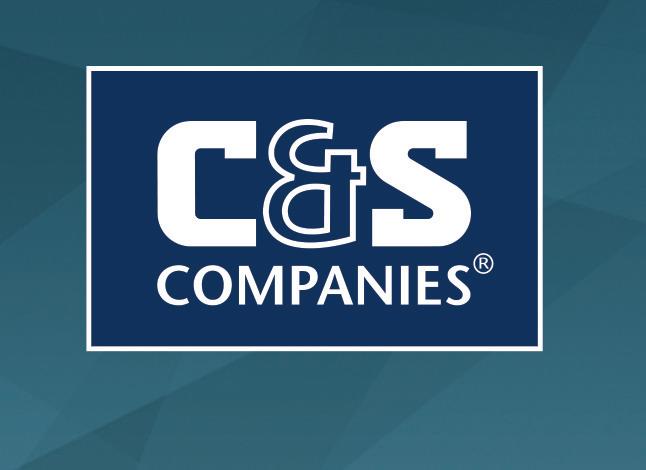























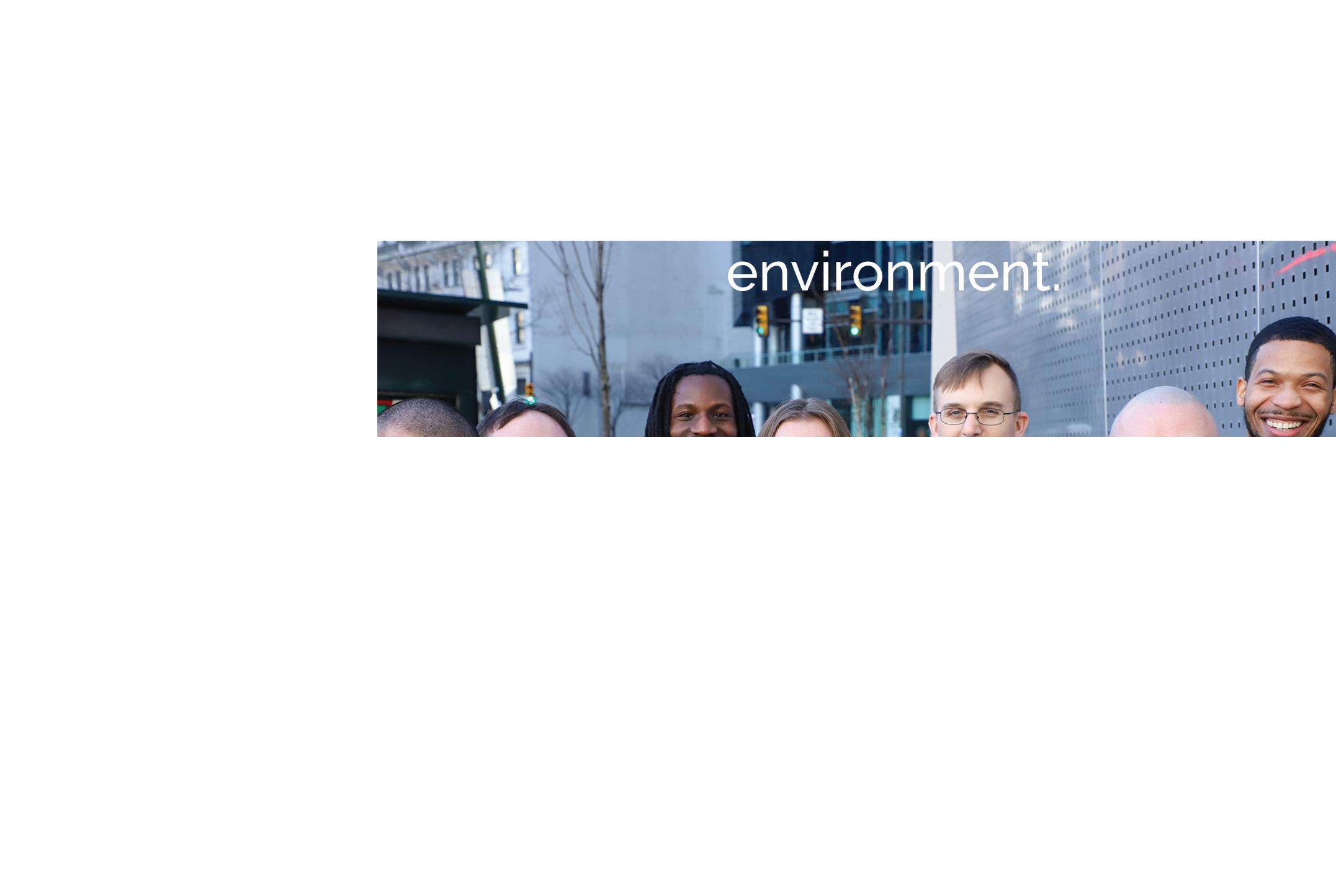

Page 19: Austin Commercial
Page 7: B2Gnow
Page 41: C&S
Page 2: CERM
Page 36: Charlotte Area Transit System (CATS)
Page 43: City of Columbia, South Carolina
Page 21: CKL Engineers, LLC
Page 20: Colette Holt & Associates
Page 24: GCAP Services
Page 17: Griffin & Strong
Page 32: Hampton Roads Connector Partners
Page 29: Houston Airport System
Page 20: Ken Weeden & Associates
Page 18: Lane Construction
Page 13: Messer Construction
Page 3: Metropolitan Washington Airports Authority
Page 5: PR PROS, LLC
Page 39: South Atlantic SBTRC
Page 39: Virginia Department of Transportation (VDOT)
Associated General Contractors of America (AGC) 2025 AGC Annual Convention Columbus, Ohio; April 8 -20, 2025 https://convention.agc.org/
WTS International 2025 WTS International Annual Conference Toronto, Ontario, Canada; May 7-9, 2025 https://www.wtsinternational.org/2025-WTSAC
American Association of Airport Executives (AAAE) 97TH Annual AAAE Conference & Exposition Atlanta, Georgia; June 8-10, 2025 https://aaae.org/annual
National Association of Minority Contractors (NAMC)
NAMC 54th Annual National Conference Cleveland, Ohio; June 17-19, 2025 https://namcnational.org/events/
Women’s Business Enterprise National Council (WBENC) WBENC National Conference
New Orleans, Louisiana; June 23-26, 2025 https://www.wbenc.org/conference/

Airport Minority Advisory Council (AMAC) 48th Airport Business Diversity Conference
New Orleans, Louisiana; June 28 – July 2, 2025 https://amac-org.com/annualconference/
Conference of Minority Transportation Officials (COMTO) 54th National Meeting and Training Conference
New York, New York; July 12-15, 2025 https://comto.org/programs-events/
American Contract Compliance Association (ACCA) National Training Institute
Aurora, Colorado, August 11-15, 2025
https://www.accaweb.org/2025-national-training-institute-2/
National Association of Women in Construction (NAWIC) 68th Annual Conference
Boston, Massachusetts; August 20-23, 2025
https://nawic.org/2025-annual-conference/
National Minority Supplier Development Council (NMSDC) NMSDC Annual Conference & Exchange 2025 Miami, Florida; November 2-5, 2025 https://www.nmsdc.org





THE CITY OF COLUMBIA IS PROJECTED TO SPEND $68,883,680.00 TOWARD THE COLUMBIA DISADVANTAGED BUSINESS ENTERPRISE (CDBE) PROGRAM OVER THE NEXT YEAR.
The City of Columbia needs contractors & subcontractors in the following areas: CIPP • Concrete Curb & Gutter/Sidewalks General Concrete • Horizontal Drilling Manhole Rehabilitation & Lining • Water & Sewer Contractors Grading • Electricians • Landscaping • Demolition
Local and non-local contractors are invited to participate in these opportunities.
Please contact Ayesha Driggers at 803.545.3955 or ayesha.driggers@columbiasc.gov to start the ebid registration process. 803.545.3950 • OBO@columbiasc.gov
www.columbiasc.gov/obo • @columbiaobo




